YEARS STRONG IN 2024
The newspaper of the Independent Education Union of Australia NSW/ACT Branch (vol 44 #7) November 2024
PP 100000871 ISSN No: 0728-4845

The newspaper of the Independent Education Union of Australia NSW/ACT Branch (vol 44 #7) November 2024
PP 100000871 ISSN No: 0728-4845

Amanda Hioe Assistant Secretary

After five months of intense negotiations between the IEU and the Association of Independent Schools (AIS), discussions over the multi-enterprise agreement (MEA) for teachers in independent schools have reached an impasse.
The points of contention
The claims that the IEU put forward for members are modest and progress has been made, but two critical issues remain unresolved:
• maintaining the traditional pay premium that independent schools have historically offered over government schools; and establishing fair, clear, and transparent standards for each school covered under the proposed MEA.
Although the union supports the shift towards a single classification pay structure that aligns with other school sectors, the AIS’s proposal for
transitioning existing teachers to the new pay scale is deeply problematic.
The proposed transitional arrangements for existing teachers, particularly those with experience, will place them at a distinct disadvantage compared to teachers who would be newly employed at the same school.
For instance, experienced teachers who have achieved Proficient status and have five or more years of teaching experience are currently classified as Band 2 (under Standards Model or Band 2 Step 13 under the Hybrid Model). When these teachers transition to the new classification structure, they will be placed at Step 2.4. In contrast, a newly employed teacher with similar experience will commence at Step 2.5, the highest step within the new classification framework.
The discrepancy highlights the inequity of the transitional arrangements which will undermine the morale of experienced teachers.
The IEU has raised significant concerns regarding the AIS proposal, clearly outlining the issues our members face. Unfortunately, these concerns
have not been acknowledged. Instead, the AIS has requested the union’s written agreement by no later than 7 November 2024 to move forward with a vote on their proposed draft MEA among their teachers. The IEU believes that the proposed MEA is not yet ready for such a vote.
With negotiations stalled, now’s the time to explore new strategies to break this deadlock.
New bargaining rules
In June 2023, reforms to the industrial landscape introduced new pathways for multi-employer bargaining. This change opens several streams through which MEAs can be created, including: single-interest bargaining stream; and • cooperative bargaining stream
These streams represent different approaches to achieving the same goal: an MEA that improves pay and conditions for teachers.
Currently, the IEU’s negotiations with the AIS fall under the cooperative bargaining stream, which relies heavily on co-operation between employers and employees (via their bargaining representatives).
While cooperative bargaining works best in environments where both sides can negotiate in good faith, it limits the union’s ability to advance members’ interests if employers refuse to cooperate.
Given the current deadlock in bargaining for teachers in independent schools, we believe it is necessary to switch to the single-interest bargaining stream to better serve our members.
Shifting streams
The single-interest bargaining stream allows unions to negotiate with groups of employers that share common interests. This stream restores balance to bargaining power, addressing the limitations introduced by the Fair Work Act 2009 (Cth). Key advantages of this bargaining stream include: support from the Fair Work Commission (FWC) in resolving bargaining disputes; and the ability to take protected industrial action if members choose to do so.
Continued on page 6
Carol Matthews Secretary

Glenn Lowe President

We are entering the festive season, a time when increased socialising often leads to the inevitable comment: “Oh, you work in schools.”
In recent months, a surge of media articles has highlighted the challenges the education sector faces, often framing the narrative in a negative light.
Many of these articles fail to provide clarity, contributing to a growing sentiment that demonises the education sector.
This ongoing scrutiny can be exhausting for educators, who frequently find
ieunswact


ieunswact
ieunswact
Newsmonth is published eight times a year (two issues per term) by the Independent Education Union of Australia NSW/ACT Branch.
Executive Editor Carol Matthews, Secretary, for and on behalf of the IEU Executive and members
Managing Editor Monica Crouch
Journalists Katie Camarena
Monica Crouch
Lucy Meyer
Sue Osborne
Photo Journalist Katie Camarena
Graphic Design Chris Ruddle
Proofreader Helen O’Regan
Contributions and letters from members are welcome. These do not reflect endorsement if printed, and may be edited for size and style at the editor's discretion. Write to:
Newsmonth
485-501 Wattle Street
ULTIMO NSW 2007
GPO Box 116
SYDNEY NSW 2001
Tel: 8202 8900
Toll free: 1800 467 943
Email: ieu@ieu.asn.au
www.ieu.asn.au
This
their Elders past and present.
themselves defending their roles at social gatherings. Conversations often take a turn when new acquaintances feel compelled to share their critiques, despite lacking a comprehensive understanding of the intricacies.
A notable example of this disconnect is a recent suggestion from a Queensland politician to reintroduce corporal punishment in schools. Such proposals reflect a fundamental misunderstanding of modern educational practices and the complexities involved in teaching.
As educators and union advocates, it is crucial to shift public perception towards a more informed and positive view of education, emphasising the dedication
and challenges inherent in nurturing young minds.
In these discussions, practising polite disagreement can be valuable. By respectfully challenging misconceptions and providing evidence-based insights, we can foster a more constructive dialogue.
As unionists, we need to equip ourselves with facts and an understanding of the issues that are making our working lives more difficult.
Maybe, just maybe, we can change the mindset of those around us and convince them that there needs to be a new attitude towards education.
Caton Assistant Secretary

The union is concerned that some employers are considering the consolidation of resources, including the amalgamation of two schools, with a diminished leadership structure. These decisions seem to be driven primarily by financial considerations.
When an employer decides two schools will amalgamate and/or operate under the leadership of a single principal, there are implications for staff. This transition can bring about challenges that need to be managed with careful planning, transparent communication, and supportive leadership.
One of the immediate effects of amalgamation is an increase in workload. A single principal overseeing two campuses or schools often means added responsibilities, not just for the principal but also for the staff.
With the need for greater co-ordination and support across both campuses, administrative and teaching staff may find themselves taking on additional tasks, leading to increased stress and longer working hours.
Amalgamation can also raise concerns over redundancy, particularly for administrative and support staff whose roles may be duplicated across the two schools.
Each school has its own unique culture and merging them can sometimes create friction. Staff from both schools might struggle to adapt to a new culture, which can affect morale. The loss of each school’s individual identity often leads to resistance to change, making it crucial for leadership to be sensitive to the emotional aspects of the transition.
Clear communication
The changes brought about by amalgamation may also necessitate additional professional development. New systems, processes and expectations can be challenging, and training sessions or workshops can help staff adapt to new ways of working. Providing support mechanisms, such as counselling services or peer support groups, is equally important to ease anxieties during the transition.
Positive learning environment
The way amalgamation is managed can have a direct impact on studentteacher ratios, class sizes and resource allocation. Teachers may need to adapt to changes in student demographics, class compositions, and teaching environments. It is essential to ensure these changes do not compromise educational quality, as maintaining a positive learning environment for students should remain a priority.
“The loss of each school’s individual identity often leads to resistance to change, making it crucial for leadership to be sensitive to the emotional aspects of the transition.”
Communication becomes more complex when co-ordinating activities, events and meetings across two campuses. Clear communication is vital to ensure that all staff are on the same page, aware of changes, expectations and policies. Leadership must prioritise the development of a robust communication strategy to keep staff engaged and informed throughout the amalgamation process.
Coordinating schedules, events and curricula across two campuses presents logistical challenges that require planning and additional resources. Issues related to facilities management, such as maintenance, transportation between sites, and resource allocation, also need to be addressed.
The stress and uncertainty associated with amalgamation can also impact staff wellbeing.
Maintaining a focus on mental health is essential for fostering a supportive and resilient work environment.
Upholding rights
Amalgamation may also affect staff contracts, union agreements and terms of employment, which need to be negotiated to avoid disputes. Ensuring compliance with existing agreements and keeping staff informed and involved throughout the process will help build trust and reduce the risk of conflict.
Open dialogue with the IEU and its representatives is a necessity to aid in a smoother transition by addressing concerns and ensuring staff rights are upheld.
The success of any amalgamation effort will rely on thorough consultation with the union and its members, along with strong leadership from the employer that prioritises clear communication, professional development, and staff wellbeing.
Liz Heggart Vice President Systemic

Well, haven’t the last 12 months just flown by? The NSW and ACT Catholic Systemic Schools Enterprise Agreement (EA) 2023 expired on 9 October.
Once again we begin the process of negotiating for a better pay deal and, most importantly, for our working conditions.
There’s our favourite word: workload.
I am proud to say that members and officers of the union have been working hard to develop the claim for the new EA, as well as new Work Practices Agreements (WPAs).
One of the biggest differences this time around has been the involvement of IEU Council delegates. There have been three
Council meetings with more than 100 member delegates at each, and these meetings have included workshops to brainstorm, discuss and refine specific issues affecting all sectors and members.
A big focus was using existing WPAs from various Catholic dioceses as the starting point for discussions.
Delegates identified gaps and weak language so we can move towards strengthening the power of these documents.
The work done at Council has flowed into sub branch and chapter meetings, and vice versa. Members were asked for their insights to ensure we collected as much information as possible on what we most need to fight for. The union also invited all Catholic systemic members to complete a survey.
I am optimistic and energised by this approach and excited to see how negotiations progress over coming weeks and months (but hopefully not years as we experienced last time).
I urge you to stay connected with the IEU through our email updates, our social media and our publications so you can keep up to date. Start conversations in your lunchrooms and share the word about the new round of negotiations.
If you’re a chapter rep or committee member, keep your union noticeboard current with the latest news, and email your members.
As Vice President Catholic Systemic on your union’s Executive, I look forward to updating you on how the process is going.
Right to disconnect; and Delegates’ rights: insertion of a clause to recognise the newly legislated delegates’ rights.
The union is also seeking to expand the scope of the enterprise agreements to include staff employed in schools who are not covered by the current enterprise agreement. These groups vary from diocese to diocese but include counsellors and other pastoral care staff employed directly by dioceses in schools; family educators; trade trainers; early childhood education and care employees; music tutors and business managers.
Meetings
The union has had preliminary discussions with representatives of the 10 dioceses. We expect notices will be issued shortly by dioceses to employees about the bargaining, and a schedule of meetings has been set.
Teacher pay
Members will have seen media reports that there is an agreement between the NSW government and the NSW Teachers Federation on a three-year deal for teachers



employed in NSW government schools. The IEU will ensure that pay increases agreed for teachers in NSW Catholic systemic schools are not less than these increases.
Under the current enterprise agreement, pay rates for teachers employed in the ACT have been agreed until the end of 2025.
Pay for general employees
In the 10 dioceses, there is a provision in the current enterprise agreement that requires the dioceses to match increases gained by support staff in government schools.
The NSW Government has reached agreement with the NSW Public Service Association (PSA) for a 4% increase from July for public sector workers, including support staff in government schools. Dioceses will match this increase, back-dated to July this year.
Broken Bay
Our claim for teachers and general employees in Broken Bay is consistent with the above claim, but we expect the enterprise agreement will have a four-year term commencing from January 2025, following the expiry of the current agreement at the end of December 2024.
The union has held two formal bargaining meetings with







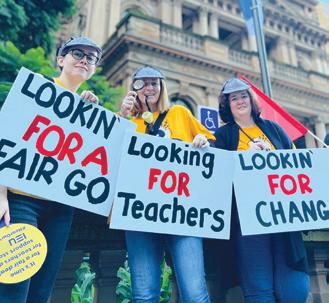



Broken Bay Diocese. The diocese has offered pay increases of 3.5%, 3.5%, 3% and 3% over the four years of the proposed enterprise agreement.
In Broken Bay, under the current enterprise agreement, pay rises for general employees will be the same as increases received by teachers. General employees therefore received the large increases gained by teachers effective from October 2023.
Broken Bay has made the same pay rise offer for both teachers and general employees for the next agreement and has committed to maintaining the 1.5% pay margin above rates in government schools.
The Broken Bay pay offer compares favourably to increases being offered elsewhere in the education sector. Despite this, the union is keen to ensure working conditions do not deteriorate as a result.
While we are moving closer to agreement in some areas, key issues remain in relation to workload. The union has raised specific concerns with the diocese in respect of its proposed changes to the Work Practices Agreement.
The union will continue to liaise closely with members as both sets of negotiations continue.
Carol Matthews Secretary
Growth Raise our Voice Optimise operations Win with members Solidarity Transparency Resolve Integrity Diversity Equality
David Towson Deputy Secretary

Many members will know that 2024 marks the 70th anniversary of our union. While we take time to reflect on the IEU’s growth and many achievements throughout that time, it is important to consider how we prepare for the challenges of tomorrow and how we can ensure the union is best placed to build on our successes.
Earlier this year, the IEU’s 22-member Executive commissioned barrister and mediator Jack Whelan to work with us in developing a five-year Strategic Plan for the union. This work included extensive consultation with the Executive, more than 100 member delegates to Council and the IEU’s staff.
The resulting Strategic Plan, Stride to Grow 2030, was unanimously endorsed by the Executive and by Council at the union’s AGM on Saturday 26 October.
The plan articulates the union’s identity and values, along with a vision for our future. It identifies our
strengths and the challenges we face, and it prioritises the union’s goals for the next five years.
The plan also incorporates several practical recommendations that we will implement, along with an accompanying detailed work plan, also endorsed the Executive. In the coming weeks and months, the project team will progress this work and report to the Executive.
The Strategic Plan affirms we are a mighty and successful union with great potential and many opportunities. Stride to Grow 2030 sets the IEU on a path of growth, challenging us to raise our voice, optimise our operations and achieve even more wins for you, our members.
I acknowledge all the members, leaders and activists who have steered and grown our union over the past seven decades. And I urge all members (and potential members) to stride to grow your union to improve outcomes for yourself, your colleagues and for nongovernment education.
IEU reps in independent schools talk about how they’re building strong chapters. Strong chapters make for a strong union and therefore greater bargaining power for all members.
Mella Presbyterian Ladies’ College (PLC), Croydon
As someone from a working class and migrant background, history teacher
Michelle Mella felt strongly that she had a civic duty to serve as a union rep.
“I’m keenly aware that Australia’s experience of nationhood is linked to the development of the trade union movement – Australia was one of the first countries to have a minimum wage and a court of conciliation and arbitration, unheard of in other places,” Michelle said.
“I appreciate everything that unions have done in this country to secure living wages for Australians and decent working conditions.
“This is a legacy that we don’t want to squander, and we certainly don’t want to end up with a group of Australians who could be deemed the working poor.”
Michelle said there is growing disappointment among members at her school with the way the Association of Independent Schools (AIS; the employer respresentative) has started negotiations, and a sense that some of the working conditions that teachers in independent schools enjoy might be reduced.
Michelle said she and other members “don’t want to see our working conditions diminished, particularly when you consider work intensification”.
“We have confidence that the union will respond to what the AIS is presenting, and we hope to get behind the union campaign.”


Members would be keen to see the ‘pay premium’ restored in independent schools for all the extra co-curricular work they do, she said.
“Teachers tell me that they’re quite worn out and threadbare, and they want to see a deal that not only entices people into the profession but keeps people working comfortably in this profession.
“Teachers do work in the evenings, on weekends, during school holidays, or what is now referred to as ‘non-term-time attendance’.
“Teachers know that the expectation is excellence, and they want to live up to that,” she said.
“But we need negotiations that support teachers in a way that is sustainable and doesn’t compromise their work-life balance, because that’s not being achieved, and morale has suffered.”
Bernadette Norton Oxley College, Bowral
Bernadette Norton is a rep at Oxley College, Bowral, in the Southern Highlands, where she teaches science.
Having been at the school for seven years, Bernadette put her hand up to become a rep this year when the previous rep left. “I was keen to do it, because I think people have got to have a voice,” Bernadette said. “It’s a serious position. People speak to the rep when they’ve got troubles, and it’s important in people’s lives. So, I thought, ‘right, I’ll do it’.”
Bernadette came to the IEU’s reps’ training in May.
“I’ll walk out of here feeling a lot more confident and also knowing who to ask when I have questions,” she said. “Our organiser has already been down to our chapter meetings and we keep in touch. He’s been a great help.”
The Oxley College chapter has grown by 17 members this year alone. “We have quite a few new members this year and others are talking about it, including our professional and admin staff,” Bernadette said.
Again, workloads are a key issue, particularly co-curricular activities. “We have to do 80 hours a year and, for a lot of it, people are not paid at all – it’s two weeks of your time a year.”
From 5pm to 7.30pm one evening a week, Bernadette runs a study club in the library for Years 11 and 12, but she receives no extra payment.
Over the past two years there has been some success for staff who do Saturday sport.
Unionism is in Holly Wright’s blood, so it’s no surprise she became a rep. “I came from a very political family, and I grew up at the knee of my grandfather, who was General Secretary at his draftsmen’s union back in the 60s and 70s,” said Holly, who teaches at Riverina Anglican College.
Holly has been a union rep for her entire 15-year teaching career, with eight of those with the IEU. “The reason I’m a union member and rep is because I believe in standing up for the collective good,” she said.
When an individual stands up against unfair treatment on their own, their strength is limited, Holly says, but when they’re part of a group, it’s easier to make a real impact.
As a history teacher, she teaches her students about the development of the union movement and appreciates its impact on creating a more fair and equitable society. She believes it’s important to remind people that today, “the average union member is a 50-yearold nurse or teacher”.
Maggie Findlay is a maths teacher and head of department at her south coast school. She says being the union rep is part of her DNA.
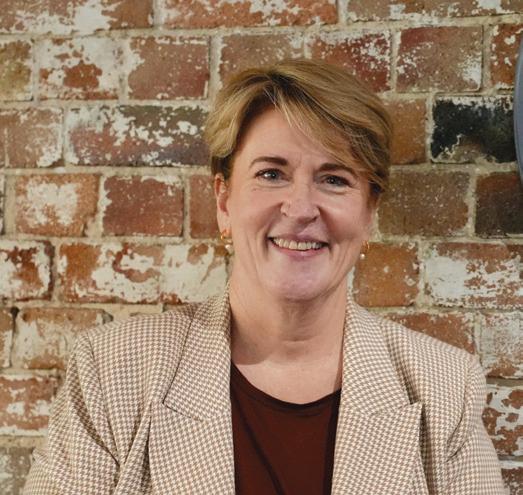

“They’re on the bus at five on a Saturday morning and don’t get back till six on a Saturday night. They’re now getting some payment,” Bernadette said.
Bernadette believes in being a rep because when members speak up, “things can change”, she said.
“It’s not about being ‘bolshie’. It’s just about giving people a voice so we can do what we say we do in Australia – have that ‘fair go’. It’s about that,” she said.
“I don’t hide from confrontation, but nor do I seek it. But a lot of people just can’t speak up for themselves. So as a union, with our strength in numbers, and not just within our school, but all schools connected, I think that gives people a chance to do their best work. That’s all we want.”
“My granddad would be proud knowing that I’m out there trying to get fair conditions for everyone and helping people fight for their rights,” Maggie said.
Staff at her school were concerned about “workload creep”, she said. “Every year there’s a little bit extra”.
Maggie would like to see school-based standards to provide clarity on what is required of each school and teacher.
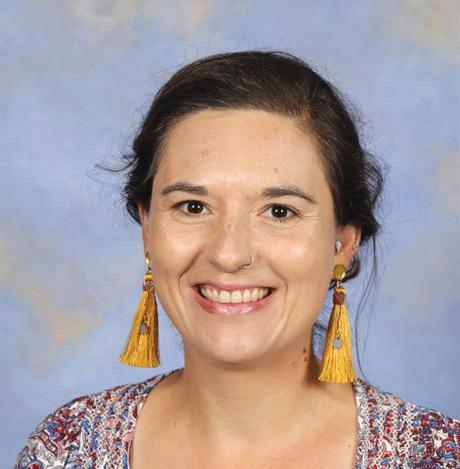

Holly has several priorities she’s focused on addressing as a rep, including recruiting more non-teaching staff and improving their conditions because “they work hard, they put up with so much”, she said. Compared with teachers, “they get a raw deal”, Holly said, and she is determined to help change that.


“At the moment, it’s unclear what each school can expect from their teachers and staff members, even in terms of what a full load of teaching looks like, how many extra duties and meetings they have to attend – what is expected of a staff member and what it means to be a teacher at each school.”
Another concern is pay parity across sectors. The historic pay rises recently awarded to government schools is the main negotiating point moving forward, she said.
Sukli Barrell teaches design and technology at Galstaun College, Ingleside, a bilingual Armenian Christian school for students from kindergarten to Year 12.
An IEU member for 33 years, Sukli has been a rep for about six years now. “I’ve always been a unionist,” she said. Sukli’s also a delegate on IEU Council, the union’s decision-making body.
Sukli looks forward to holding chapter meetings to talk about the benefits of union membership and seeing her chapter grow this year, especially among the professional staff.
“Anything you need at work that you haven’t got, you’re not likely to get it unless you’re in the union,” she said. “And the more numbers you’ve got when you ask, the better chance you have.”
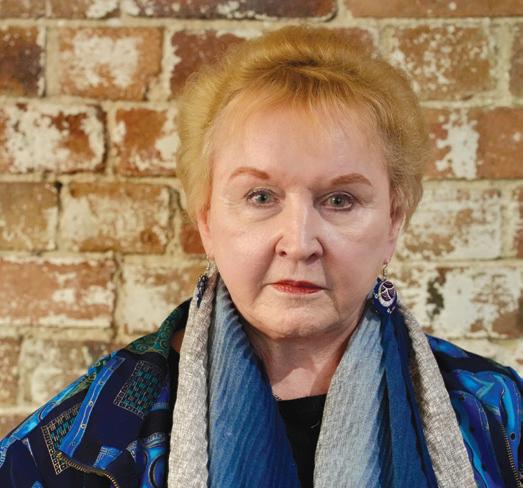

Sukli attended IEU reps’ training earlier this year. “I wanted to learn more about how to be a rep, how to go about it, and if people ask me things, how to go about getting the right information for them,” she said.
Alex Thompson teaches history at Canberra Grammar School, where he has been an IEU rep for some years.
Alex said he is worried about the pay in independent schools falling behind salaries in NSW government schools.
“We are not going to be able to attract and retain staff, which is going to put more pressure on those left to cover classes and manage minimum supervision. It’s going to lead to a reduced educational experience, and no one wants to see that,” Alex said.
“IEU members want everyone, whether they’re a teacher or professional or operational staff, to join the union, because if we stand together, we will be able to let the principals know that we will not accept a reduction in pay, or leave conditions,” he said.
“We want our principal to tell the AIS that we need a deal which will attract and retain experienced staff so they can do their job of leading, teaching and learning and supporting students every day.”
Alex said he enjoys being a rep as it brings staff together and gives them a voice.
“I find it extremely rewarding, and that’s why I keep coming back to do it year after year and have been trying to encourage others to get involved with our committees so that they can experience being a force for positive change.
For Alex, when he hears from a fellow member with an idea to improve their school or when he supports a colleague who is facing challenges, those are the best parts of his day.


“I think the union is an important part of independent schools in providing a line of communication to management that sits outside of the chain of command. And I’m grateful that we’ve got an executive who appreciate and understand that.”
Alex said school-based standards are important to his members. They also want to see a reduction in workloads.
“We think the union’s proposal for schoolbased standards that consider the situation of an individual school is the right way forward.
“It makes it clear what the work of a teacher entails and ensures there are effective committees for teachers and support staff to make workloads more manageable, more efficient and prevent burnout and staff attrition.
“Overwork is making teaching untenable. We want to bring the joy back to the classroom by working collaboratively with our management through a committee and through sharing information.”
Sharon Draper became a union rep to seek recognition for teachers who often don’t speak up for themselves.
“Teachers rarely put their own needs ahead of their students, and that’s often used against us by management to make us give more, do more, or feel guilty about standing up for our own entitlements and rights. So that’s one of the big reasons that I’m a union rep, because I know that unity is strength,” Sharon said.
She feels that independent school staff pay, particularly for support staff, is falling behind compared to other schools.
“We’re concerned about the underlying threat made by management about smaller regional schools not being able to afford any pay rise, and there will be job losses as a result,” she said.
“Increasing workloads is a concern for all and having some workplace standards about what is a full load, what are extracurricular activities, what is the long service leave policy, etc, would be good so we know what our entitlements are.”
“I was inspired to become a union representative after witnessing what other reps were able to achieve in the workplace when we band together,” said Will, who is a teacher at Aspect Hunter-Port Macquarie.
“I also wanted to learn more about our rights in the workplace to better support and empower teachers and support staff,” he said.
Members at Will’s school are part of the Now’s the Time campaign for a whole new deal in independent schools.
Long before Joe Clark was an IEU rep or a teacher, he found himself acting as a “gobetween between staff and management” while working in industries without union representation.
He did what he could to negotiate on behalf of his colleagues and support their interests.
“The members of my school would like to see fairer wages for teachers and support staff, and more transparency and fairness in school-based standards that clearly set out the workload expectations,” he said.
one –teachers don’t feel supported, no matter where they are.

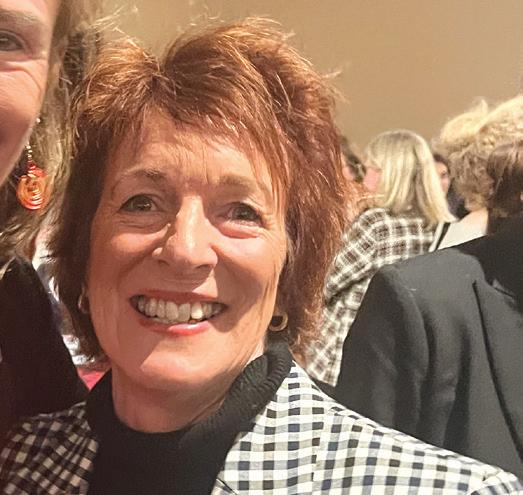
When he entered teaching, Joe worked at international schools overseas, which were once again lacking in union representation. He came to Australia and became interested in the union movement and the extra support unionism could provide.
So, when a vacancy arose at Joe’s school, International Grammar School (IGS), “I put my hand up and said, ‘let me get involved because I want to fight for fairness within the school’,” he said.
Joe’s seen teacher shortages around the world. He believes the key problem is a shared
Sharon said teachers want to be allowed to do their job and receive fair and timely outcomes from the current negotiations that support their work.
“A big issue is teacher wellbeing. We look after the children’s wellbeing, yet our own is often neglected, and it’s difficult to look after others when you’re not being looked after yourself.”
“It is not so much what inspired me to become a rep but who inspired me,” said Narelle Ryall, a teacher’s aide at Aspect Riverina School in Albury, NSW.
“When I first started my job, the only staff employed were two teachers and myself,” Narelle said.
“We had 12 students to teach. As the numbers of students increased, so did the number of staff, and this is when I met Robyn Davis, another teacher. Robyn has a passion for helping and nurturing both students and staff.
“Over time, the number of students and staff grew, and Robyn was always there with a shoulder to cry on, wonderful advice and a tenacity to find a solution for a tricky situation,” Narelle said.
Robyn introduced Narelle to her IEU organiser, Lyn Caton [now Assistant Secretary], who became another inspiration. “Lyn would ring and check up on me through those tricky times,” Narelle said. “These two wonderful women, Robyn and Lyn, are still great inspirations.”
Narelle then met “more amazing union women” – IEU members, organisers and officials.
“They all inspired me to become a rep so that others can be represented with integrity, honesty, passion and tenacity,” Narelle said.


Through their encouragement, Narelle became an IEU Council delegate, joining more than 100 other members on the union’s decisionmaking body. Narelle notes the constancy of union representation throughout many changes at her school, which recently welcomed a new principal.
Members at Aspect Riverina are part of the Now’s the Time campaign for pay rises and school-based standards in independent schools. “Staff would like a pay rise, safer working conditions, better tools of trade to enable them to do their jobs better, and greater respect through honest and open communication,” she said.
Helen Templeton Vice President Non Systemic

Last year, IEU members in Catholic independent schools were presented with a proposal that was described by employers as their final offer for improved salaries and conditions. This offer was not good enough and union members rejected it.
The IEU and Catholic Employment Relations subsequently found a way to negotiate a better agreement that properly valued the work of teachers and support staff in Catholic independent schools.
I think of this episode as I see the propaganda being issued by the Association of Independent Schools (AIS).
The AIS is saying the union is standing in the way of pay rises that should be awarded in February. One AIS representative advised staff, “The IEU is keen to be able to have staff take Industrial action, as part of their negotiations.” This is nonsense. Such simplistic and specious statements demonstrate a limited understanding of industrial relations and do nothing to further negotiations.
Teacher salaries in government schools have moved further ahead, with a 3% increase in October 2024. If independent school employers choose not to pay an increase in February, it will be on them and IEU members know this.
There is nothing stopping any independent school entering into a singleinterest agreement with the IEU that provides satisfactory pay increases, clarity around workloads and improved conditions that match industry standards.
As Newsmonth went to press, the AIS pay offer to teachers in NSW independent schools is a disappointing step backward.



Members at Joe’s school have several concerns, he said, including “administrative creep and the working conditions for teachers”, the next round of negotiations with the Association of Independent Schools (AIS), pay grades, given the “cost of living crisis and rents in Sydney”, as well as protecting holidays and the right to disconnect.
As a rep, Joe wants to do his best for members at IGS. “It’s about fairness and being given respect, and that you deserve that as a professional,” he said.
Independent schools Now’s the time to stand together for a better deal
The AIS has been spruiking the line that teachers’ salaries would be 6% higher than those in government schools. But it doesn’t take into account the 3% pay rise just awarded to teachers in government schools nor the impact of the translocation table in merging three different agreements into a single agreement.
The reality is that many teachers, particularly those at higher levels, will receive only minimal improvements. It will take years for some teachers to catch up to the salaries being paid in NSW government schools.
This offer fails to address critical issues affecting teachers, including fair pay progression, transparency around teaching expectations, and adequate support for those in promotion positions.
The proposed reduction in personal and carer’s leave, which would eliminate the upfront 15 days for new hires, would have been a further blow to teachers’ rights. I am pleased to see the employers have now removed this element of their claim from the table.
Teachers deserve better. Your union is here to advocate for fair pay and working conditions. By encouraging your colleagues to join the union, you strengthen your collective voice that can push for better offers and protect your rights in the workplace.
Teachers in AIS independent schools should not accept substandard treatment. By standing together in union, we can fight for the conditions we deserve. If you know of colleagues who are not already members, now’s the time to remind them to join: strength in numbers ensures a more powerful voice to get a fair deal for all.
Have you signed our petition to say YES to single interest bargaining? See page 6.
Carol Matthews Secretary

IEU representatives met with the Association of Independent Schools (AIS) on Friday 1 November to discuss the draft multi-enterprise agreements (MEAs) for professional and operational staff in independent schools.
There are two MEAs – one for NSW and one for the ACT. The rates in the draft MEA for the ACT are higher and the AIS has confirmed that the ACT offer would be increased to 4.5% in 2026 and 4% in 2027, in line with a revised offer made by ACT independent schools for teachers last week.
The IEU had previously raised a number of drafting problems. A key problem was the step that employees would be transferred to under the new classification structure.
The IEU has also sought clarity on exactly who will be covered under the MEA and where they fit. The AIS has advised that sports coaches and music tutors will be included, as will professional staff such as HR managers and media advisers, etc.
The union has sought an explanation as to how “outdoor education” staff will be classified. Staff being included in the MEA for the first
time
The AIS has addressed some of the drafting problems, and discussions are continuing.
We have provided the AIS with comprehensive comparisons of the proposed MEA rates with rates applying in Catholic independent schools, Catholic systemic schools and NSW government schools.
In some cases, the proposed AIS rates are well below the comparable rates in other sectors.
The table below uses full-time annual salaries for some sample positions: see table below.
The union will scrutinise all proposed pay rates in the MEAs to identify the rates that are too low.
We will not support an MEA that does not contain fair and reasonable pay rates for professional and operational staff.
Continued from page 1
In 2022, during the historic joint industrial action by Catholic systemic and NSW government school teachers, independent school teachers were unable to participate in protected industrial action due to these legal limitations. Shifting to the single-interest stream provides an opportunity to overcome such constraints and build real bargaining power.
Majority rules: The need for 50% plus one It is plain to see why employers are resisting change, but the power to authorise this approach lies with our teachers in independent schools. If we can demonstrate that a majority (50% + 1) of teachers in each independent school support the shift, the FWC will grant us authorisation.




To achieve this, we are gathering support through our confidential online petition (see QR code, below left), which targets teachers in independent schools. The data collected will only be used to secure authorisation from the FWC and never shared with anyone else, particularly employers.
The power of the collective
This bargaining and all future bargaining for teachers in independent schools lies in your hands. Every signature on the petition strengthens our case to pursue fairer pay and better working conditions.
This is a critical moment to embrace change and reclaim our power. Encourage your colleagues to join the union and
support this campaign. The strength of the union lies in the collective strength of its members. Together, we can shape a fairer future for all.
If you are not yet a member or know someone at your school who is not an IEU member, now’s the time to join the union. Your voice and participation are essential in driving real change for our profession.
Amanda Hioe Assistant Secretary
You may have heard a lot of information about our campaign for single-interest bargaining and about your multi-enterprise agreement. Here’s a quick update on the campaign as Newsmonth went to press.
Negotiations: The union is still negotiating. At a meeting on Friday 1 November, we discussed the teachers’ MEA. We finally received a draft MEA that the AIS pressed us to sign off on by 7 November. However, we still had serious concerns about pay scales. In addition, we were concerned that the document would not achieve what the AIS said it would.
Why the IEU is saying no to the current offer: The union has concerns in the crucial area of translocating existing employees to the new pay scale. In particular, existing teachers are disadvantaged compared with new teachers both in NSW and the ACT.
Have you signed the petition?
Scan the QR code at left and say YES to single-interest bargaining.
Thank you to everyone who has already signed the petition – your voice strengthens your position as we negotiate for a better outcome. We also extend a warm welcome to the hundreds of new members from AIS schools who have joined the union in the past few weeks. We are stronger together!
Vice President Support Staff

Thirty years ago, the Independent Teachers Association changed its name to the Independent Education Union, reflecting the inclusion of support staff in non-government schools. It is a great thing that all staff working in the one workplace can belong to the same union.
I am pleased to share the news that this year’s annual report shows that our support staff membership has grown by 2.4% over the last 12 months, with particularly strong growth in independent schools.
The Public Service Association (PSA) covers non-teaching staff
in government schools. PSA members have voted to accept a new pay offer, which is a considerable improvement on the government’s original offer.
Under clause 20.3 of the 2023 Catholic systemic agreement (which doesn’t cover members in the Broken Bay Diocese), any increase paid to school and administrative staff in government schools in 2024 will also be paid to support staff in Catholic systemic schools.
The PSA has reached an agreement with the following pay rises: 4% from 1 July 2024 (to be back paid) + 0.5% superannuation (already awarded)
• 3% from 1 July 2025 + 0.5% superannuation; and
• 3% from 1 July 2026

The agreement also offers a cost-of-living allowance (COLA) to counter the impacts of an inflation rate, should it be above 3.5%. If inflation continues to trend downwards, there is less likelihood the COLA will be applied. Nevertheless, it is good to know it is there.
This clause means that when the new Crown Employees (School Administrative and Support Staff) Award is made, the 4% increase will also be paid to our members and back paid to 1 July 2024.
After our long fight to gain wage parity with our colleagues in government schools, it is great to note that our union included clause 20.3 to ensure we didn’t slide backwards.
Negotiations for a new MEA in independent schools continue.
When the pay rise comes through, please speak to a potential member about where the extra pay came from and invite them to join their union. Together we are stronger.
Support staff members Vickye McKechnie and Tracy Bancroft work together as a team to represent the IEU for all staff at St Joseph’s Catholic Primary School, Port Macquarie.
Tracy has worked at St Joseph’s for 22 years. “I moved from Western Sydney and started at Joey’s as a casual, one day a week in the office, printing our school newsletter,” she said.
“Then I became the school’s library/ technology assistant before moving into the classroom to support the needs of our students.”
Tracy has worked across all grades, but she currently works mainly in Stages 2 and 3.
“I love my job, even though it can be challenging,” she said. “But seeing our students achieve and grow is amazing.”
Vickye started at the school as a volunteer. “Becoming a parent in the St Joseph’s community in 2000 as my oldest son began his first year of school, I threw myself into school life and became a part of my son’s education by volunteering,” said Vickye.
She volunteered in every aspect of school life, from the classroom to the canteen, at carnivals, on committees, at parent assembly, and she helped fund raise.
“Fast forward seven years to 2007 and I accepted a paid position as an Educational Assistant.”
Tracy became an IEU rep in 2016 when the teacher who was in the role moved on. Vickye joined her in 2018, and the pair decided to work as a team.
“I attend regular sub branch meetings across the Mid North Coast and was lucky enough to be invited to the 2024 March Council Meeting in Sydney as an observer,” Tracy said.
Subsequently, Tracy was elected to IEU Council as a delegate for the Mid North Coast Sub Branch. Council is the union’s decision-making body of more than 100 delegates.
them on to our IEU organiser,” said Tracy.
“I started networking with all support staff in the Mid North Coast Sub Branch area to offer support during the Hear Our Voice campaign.”
Tracy said getting support staff active in the union is important. Having two support staff members representing teachers has not been an issue. Tracy said it has increased the representation for support staff within the school.
“We are very equal at this school,” she said.
Vickye has long been interested in what the union stands for, as well as the many benefits and safety that the union provides its members.
“I attended chapter meetings and before long, became the minutes secretary of our chapter,” she said.
“It was at this point I became involved in helping to organise information sessions, chapter meetings and advocating for our school members as a support staff employee, assisting the two St Joseph’s Primary School representatives.”
One of the school’s reps left and Vickye was nominated. She was accepted and ratified as the second rep alongside Tracy.
“This proved to be a unique situation, with the position of rep held by two support staff members,” said Vickye. Like Tracy, she was invited to the Council meeting in Sydney to observe proceedings.
“I progressed from an observer at the Council meeting to now becoming a delegate for the Mid North Coast region,” said Vickye.
“It has been a whirlwind ride, but being part of the union keeps you well-informed and more confident in the workplace, meeting many lovely, like-minded passionate people along the way.
“This proved to be a unique situation, with the position of rep held by two support staff members.”
“This is where I can advocate for educators and especially support staff. I have built and managed a large chapter of members within our school. I have grown in confidence as I am willing to speak up for what is right.”
Tracy encourages members to stay informed via the IEU Facebook page and the website.
Open and honest
“Vickye and I hold regular chapter meetings where staff can discuss openly and honestly any issues and seek guidance from us, or we refer
“We both thoroughly enjoy the experience of being St Joseph’s reps, learning an enormous amount and having the honour and privilege of campaigning on behalf of our peers.”
Working as a team has advantages, Tracy says. “We all know the challenges and are able to support each other,” she said. “You have car insurance for your car, why would you not have insurance for your job? The IEU is your insurance,” she said.
The pair encourage support staff to consider becoming a union rep.
Sue Osborne Journalist
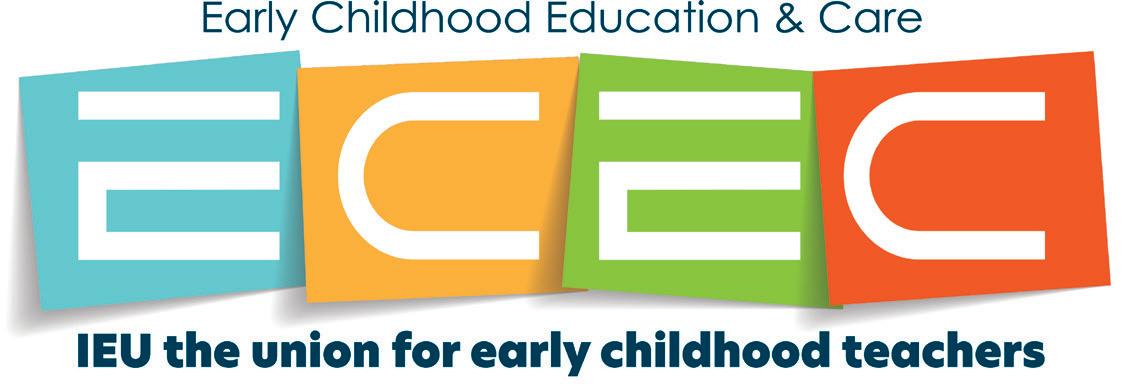
Goodstart Early Learning, the biggest non-profit employer of teachers in long day care in Australia, will be among the first to access new government funding to increase wages as members voted on a new union-negotiated agreement.
After a lengthy bargaining process, members were voting on the new Goodstart enterprise agreement (EA) as Newsmonth went to press.
In August, the federal Labor government announced a $3.6 billion funding injection so employers such as Goodstart could provide staff with a 15% pay rise, as long as employers opt in to a worker retention payment grant system. Staff will receive a 10% increase in December 2024 and another 5% in December 2025 – the result of three unions working with the government and 64 employers (see right).
The new Goodstart agreement includes pay rises and new provisions that better reflect teachers’ evolving workplace needs, including: 15% wage boost (10% in December 2024 and 5% in December 2025) improved parental leave: enhanced provisions for paid parental leave, stillbirth, pregnancy loss, and unpaid grandparent leave • inclusion support: initiatives and working groups to better support children with additional needs teacher workload: working groups focused on reducing teacher documentation and ensuring sustainable workloads; and
gender equity leave: introduction of reproductive health leave and gender-transition leave.
These improvements reflect the union’s commitment to supporting employee wellbeing and workplace equity.
The IEU congratulates members and thanks Goulburn Goodstart teacher Kylie Clewitt, who was a strong advocate for members during negotiations.
Supported bargaining agreement
In separate negotiations, the IEU, along with the United Workers Union (UWU) and the Australian Education Union (AEU) was set to finalise a historic multi-employer bargaining agreement that included 64 employers as Newsmonth went to press.
This will give long day care employees access to the 15% pay rises provided for by the federal government through the $3.6 billion funding injection announced in August.
The agreement was made possible because of new industrial relations rules passed as part of the Secure Jobs Better Pay Act in 2022.

The IEU’s Unite for Change log of claims for teachers in 103 community-based preschools was put before the Fair Work Commission on 25 October.
It was a momentous day, the first ever supported bargaining proceedings for preschools.
The IEU and its members in community-based preschools across NSW are seeking transformative change for the sector so that teachers and educators are professionally recognised.
The Unite for Change log of claims provides for the following: Equity and parity with school settings. A commitment that education is a continuum from preschool to the conclusion of a child’s education – funding, pay and conditions must reflect this. Pay: substantial wage rises to secure parity with teachers in school settings.

Conditions and rights at work: substantial improvements to better support preschool teachers and provide equity with school settings; highlights include improvements to non-contact time, professional development, parental leave, personal leave and delegates’ rights.
The IEU is calling on the NSW government, which funds the community preschool sector, to fully fund the pay rises.
Preschools not part of the current bargaining can vote to join the agreement in the future.
If you need more information on the Unite for Change campaign, we invite you to contact your IEU organiser or call the union on 8202 8900 and ask for the Duty Officer.

There has been so much happening on the ECEC bargaining and professional front.
The most prominent is the progress of the supported bargaining negotiations for pay rises for teachers in community preschools in the Fair Work Commission.
This is being led by a passionate team of IEU organisers and preschool teacher members/ ambassadors (see left). A full-day hearing was held at the Fair Work Commission on Friday 25 October, and members will have received detailed updates from the union via email.
Pedagogy and practice
The 2024 Early Childhood Australia National Conference was held in Brisbane from 17-20 September. This year’s conference was titled ‘Realising the vision: An integrated future for the early years’.
Before the conference, delegates had the opportunity to tour a variety of childcare centres across Brisbane and the Sunshine Coast. The tours were a wonderful way to network and connect with other equally passionate teachers and educators from across Australia and beyond, including from Malaysia. It was a joy to see centres honouring and upholding children’s right to play.
The conference included many engaging presentations, providing delegates with moments to reflect on the pedagogy and practice in their own centres. It was a time to consider how we value the children in our early learning spaces authentically. There were a few common themes across the conference, such as slow pedagogy, which sparked some interesting questions. Are transitions in settings robbing our early learners of the opportunity for deep learning or honouring rituals? How can we create a space that allows us to be ‘present’ in the environment to stop, engage and practise deep listening with children?
Other topics included trauma-informed practice, children’s development of executive function skills for flexible thinking in the 21st century, and children’s stages of escalation/de-escalation with challenging behaviours.
The 2024 Early Childhood Australia National Conference was most definitely a feast for the mind and a delight to the soul.
Two proud IEU members were interviewed for the Wentworth Courier cover story of 16 October, ‘Big things grow’.
Preschool teacher Jacqueline Whiley, of Dover Heights Community Preschool (pictured on the Wentworth Courier cover, bottom right), and director Felicity Barclay, of Gordon Community Preschool, explained why they’re part of the IEU’s Unite for Change campaign, calling for pay rises for staff in community-based preschools.
“There will be a cost benefit to society if we put more money into early learning,” said Felicity. “We will see the benefit across a number of sectors – health, social welfare, justice.
“Over the years we have become increasingly aware that the early years are formative years in terms of children’s brain development and an important time as they transition from preschool to school.
“What hasn’t kept up is an understanding from the community and government that there’s a group of qualified and experienced teachers who are facilitating and supporting that learning.”
Jacqueline notes the difficulties her preschool is having with recruitment. “It’s really difficult – obviously, it’s the pay,” she said.
“At the moment we have three staff who are studying for their degree and the chances are that when they graduate, they will go work in schools where they can earn tens of thousands of dollars more, even though I’m sure they would prefer to stay in early childhood. That sort of money is a lot for people when they are paying rent and mortgages. It makes a big difference in their lives.”
IEUA NSW/ACT Branch Secretary Carol Matthews said: “We have called on the NSW government to look at why teachers and educators in preschools are getting paid less than their colleagues in other states and but also teachers in schools, and what they can do to help fix the problem.”
Preschool teachers guide children in their vital early years, setting them up for success at school and lifelong learning. It’s time to pay them what they’re worth.




IEU members joined fellow teachers, support staff, and principals, along with Catholic education leaders, students and parents, for the Catholic Schools NSW Aboriginal and Torres Strait Islander Conference in Tamworth from 22 to 24 October. This year’s theme was ‘Spirit on Country: Learning Together, Then, Now and Always’.
The triannual event, of which the union is a sponsor, is an important time for many students and staff, including Karen Tighe, Catholic Schools Subject Matter Expert: Indigenous Education K-12. “The conference is a unique opportunity for all educators to gather on Country to reflect, learn and share their journey with an open heart to make a difference for our students to a hope-filled future,” said Tighe.
This year, the conference was jointly hosted by Armidale Catholic Schools and Catholic Schools NSW (CSNSW). It featured opportunities for professional learning, including workshops, presentations and experiences on Country. “The conference focuses on the critical role of supporting Aboriginal and Torres Strait Islander students to become successful lifelong learners and to set far horizons,” said Tighe.
Guest speakers included mental health advocate, former NRL player, and Dunghutti man Greg Inglis; Pro Vice-Chancellor

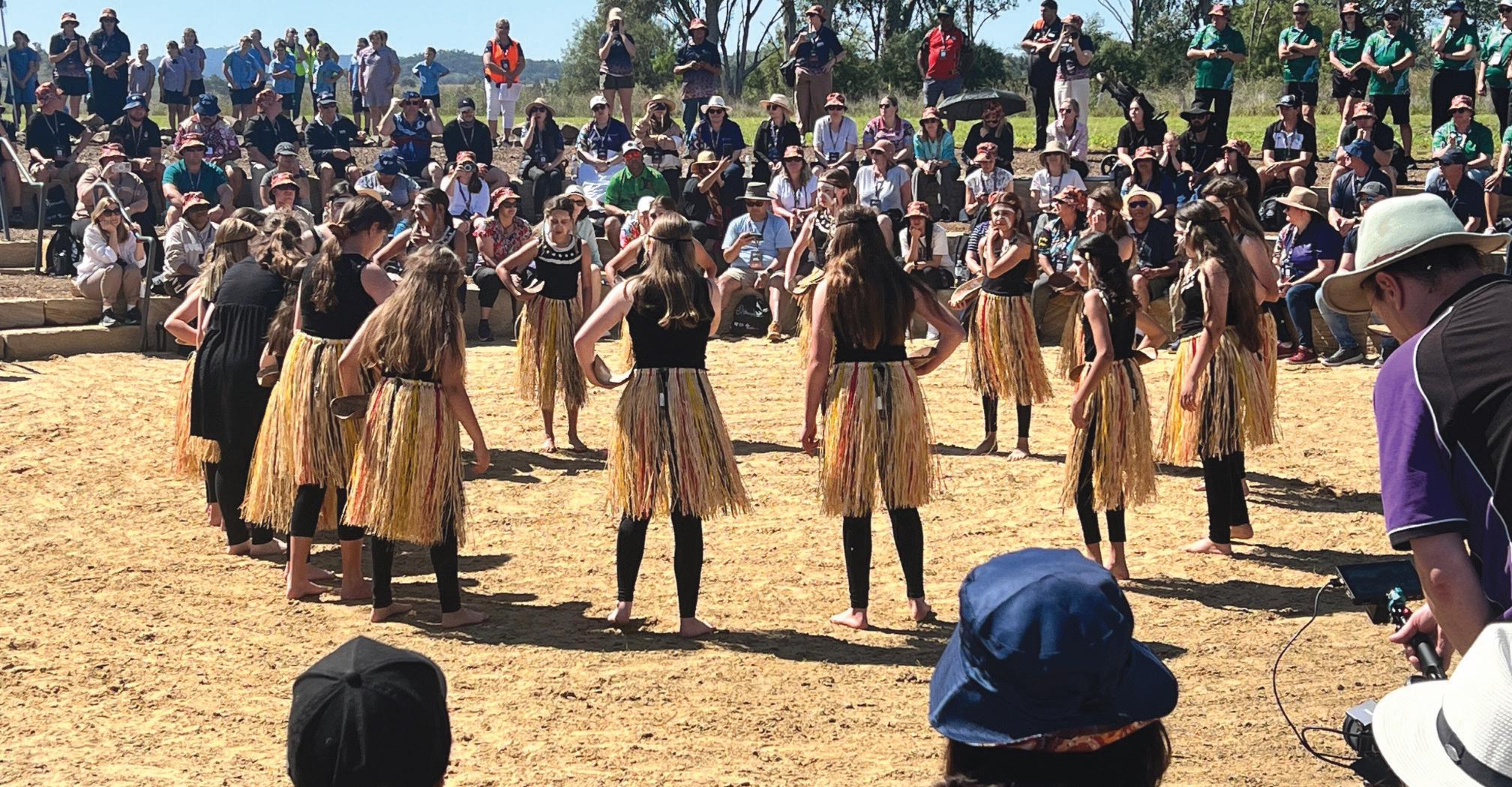

Acknowledging Myall Creek
The three-day event began with time on Country at the Myall Creek memorial site, with a Welcome to Country and a smoking ceremony. Attendees came together at the site to remember and honour the Wirrayaraay People who were killed in a massacre there in 1838.
At Myall Creek, “It was hard not to have feelings”, said Aboriginal Education Worker and IEU Vice President Support Staff, Kylie Booth-Martinez.
“The fact we are gathered on Country at the Myall Creek Memorial site truly reflects the message of the conference of learning together – then, now and always as educators,” said Tighe.
“It’s also a gathering of amazing Aboriginal educators sharing and leading cultural knowledge in a western education system which highlights the excellence and celebrates successes in Aboriginal education in NSW Catholic Schools.”
It’s important for the IEU to sponsor such an event, said Booth-
If you are an early childhood education and care (ECEC) member, you will have received your final edition of Bedrock for 2024 with this copy of Newsmonth.
In this issue of Bedrock, read about the pay rises coming in the long day sector next month. Learn about Unite for Change, the IEU’s campaign for better pay and conditions in community preschools.
Check out our special four-page lift-out on new ACECQA information sheets about reducing documentation. The IEU has worked with ACECQA to develop guidelines for cutting duplicative paperwork.
Elsewhere, meet NSW Premier’s Teacher Scholarship winner Alex Sutherland, who shares his philosophy on risky play.
Message sticks open conversation
In the lead-up to the conference, a message stick travelled from community to community in the Armidale Diocese. Traditionally, message sticks were passed between language groups and clans to transmit messages and information, Tighe explained.
The CSNSW message stick is typically handed from the hosts of one conference to another; but this year, the Armidale Diocese Aboriginal Education Committee decided to share it with schools and communities too. Each week, it was passed from community to community, including a stop at St Mary’s Catholic Primary School in Armidale.
“It has opened conversations about the conference, reconciliation and brought communities together through the message of education – in particular Aboriginal Education and it belonging to everyone,” said Tighe.
Lucy Meyer Journalist

In October, IEU organiser Tina Smith spoke to third-year early childhood education students at the University of Sydney about their workplace rights and the benefits of joining the union.
Many of the students are already working in early childhood centres. In the interactive session, Tina ran through real-world scenarios students might face in the workplace and she explained industrial issues, including the differences in rights and conditions for teachers working in long day care versus preschool, casual conversion to permanency, the modern award and supported bargaining.
Tina’s visit is part of a broader effort at the IEU to build relationships with different universities and recruit students to the union. Following Tina’s presentation, the class discussed their takeaways and approached her with questions.
IEU membership is free for students and after hearing Tina speak, almost the whole class signed up. Seeing the large pile of signed membership forms, Tina told the students: “That’s a collective group of people who want better outcomes!”
We warmly welcome our new members to the IEU.

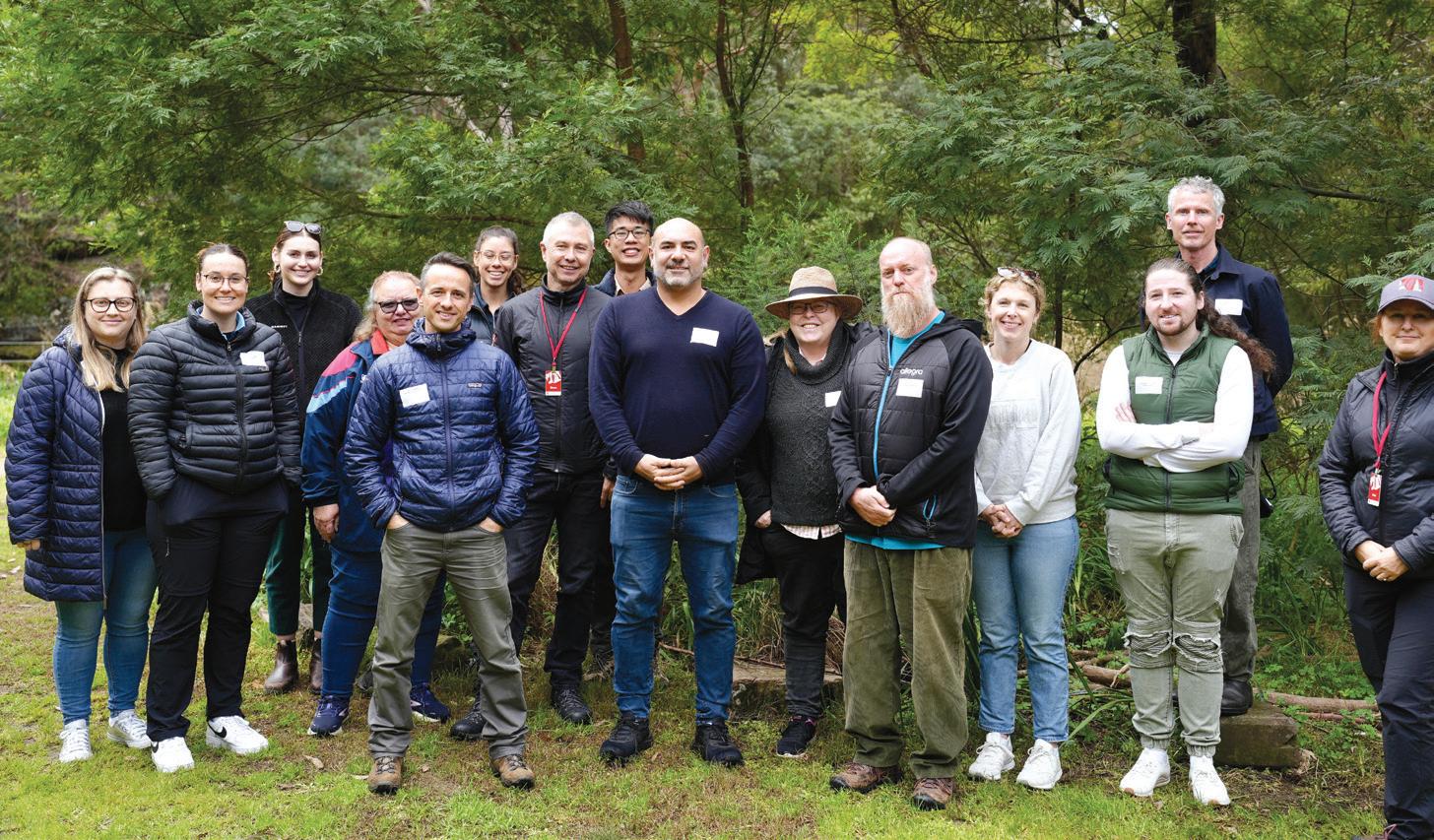

An edited extract from the IEU’s 2024 Annual Report
We’ve seen great changes – and gains –throughout 2024 in both the political and industrial arenas.
Federal government initiatives
The election of the federal Labor government in May 2022 has seen improvements in the rights of workers, including IEU members.
There have been several tranches of legislative changes to the Fair Work Act 2009. These reforms have altered the industrial landscape, providing new opportunities for bargaining and introducing new rights for employees and union delegates.
Changes to multi-enterprise bargaining, effective from 6 June 2023, mean there are now three types of multi-employer bargaining that are more accessible than the bargaining streams which existed previously. There are also more rights for unions in the new procedures.
Importantly, even in the co-operative stream where the union has the least bargaining rights, it is much more difficult for a multi-enterprise agreement to be put to a vote of employees without the union’s agreement. This has assisted the IEU in bargaining in areas such as independent schools and Christian schools.
The union can seek to activate the single interest bargaining stream, where there are greater bargaining rights, even if the employers don’t agree. We are now taking this approach in independent schools.
The new supported bargaining provisions were the basis of two separate applications by the IEU in conjunction with other unions for members employed in long day care centres nationally and for members in NSW preschools.
Members have applauded the new right to disconnect, effective from August 2024. And, despite grumblings before August from a small number of non-government school employers, it appears that staff and schools are embracing the new provisions.
New delegates’ rights provisions have enabled the IEU to train more reps, and given our reps more confidence in this role in their workplaces.
In August, the federal government announced it would provide $3.6 billion to support higher wages for teachers and educators in long day care centres and before and after school care, provided the wages were 15% above the relevant modern award rates. This is a game-changer in the sector.
This decision was the direct result of the IEU and other unions making a supported bargaining application to the Fair Work Commission. The union is hoping for similar co-operation from the NSW government in relation to the funding of pay rises in community preschools.
The IEU’s work in achieving change in consultation with the federal government and its agencies in relation to compliance and workload requirements is extensive.
The federal Labor government has shown a desire to address workload and teacher attraction and retention issues in consultation with unions. The IEU is pressing employers to ensure these policy changes result in practical improvements for our members in schools and early childhood education and care (ECEC) centres.
Election of the NSW government
The election of the Labor government in NSW in March 2023 has been beneficial for IEU members.
The pay rises promised by the new Labor government for teachers in government schools were finally delivered in October 2023.
There is a new focus on work health and safety, with the government consulting with unions. Industrial Relations Minister Sophie Cotsis has met with IEU representatives and is committed to improving outcomes for workers.
Education Minister Prue Car and senior representatives from the Department of Education have met with the IEU to discuss the provision of government funding to support increased pay rates for teachers and educators in preschools because of our supported bargaining application.
The NSW government has also committed to addressing teacher workload and teacher recruitment and retention.
The NSW government provided pay rises for teachers in NSW government schools of between 8% and 12% from October 2023, and these increases were matched by Catholic systemic schools.
In the ACT, a new enterprise agreement, made in August 2023, provided an uplift in teacher salaries in ACT government schools over the period from 2023 to March 2026, with a new graduate earning over $100,000 by the end of the agreement. The Catholic Education Archdiocese of Canberra & Goulburn paid increases of the same value, but with a different configuration of increases.
Teachers in Catholic independent schools received large pay rises because of the increases in the public and Catholic systemic dectors.

The union has had some success in flowing on these increases to teachers in Christian schools and has finalised a new enterprise agreement applying to teachers in Christian schools represented by the Association of Independent Schools (AIS) in early 2024.
However, although there have been pay rises in 2024, bargaining has not proceeded smoothly with schools in NSW and the ACT represented by Christian Schools Australia.
The union is prioritising workload claims in negotiations with employers.
We achieved workload improvements in Work Practices Agreements negotiated with Catholic dioceses in late 2023. However, ongoing teacher shortages are frustrating some entitlements – in particular, release time and caps on class sizes. The union has also assisted members to address workload concerns in individual chapters.
We are campaigning for school-based standards in independent schools (see pp 1, 6).
Pay and conditions for support staff
Support staff in Catholic systemic schools received increases in 2023, with many classifications gaining wage adjustments from the start of 2023 to match earlier public sector pay equity increases, as well as other general increases. There were delays in some members receiving back pay and union staff were kept busy checking payments.
The IEU successfully negotiated to match these rates in Catholic independent schools in late 2023 and is currently seeking similar increases for support staff in independent schools.



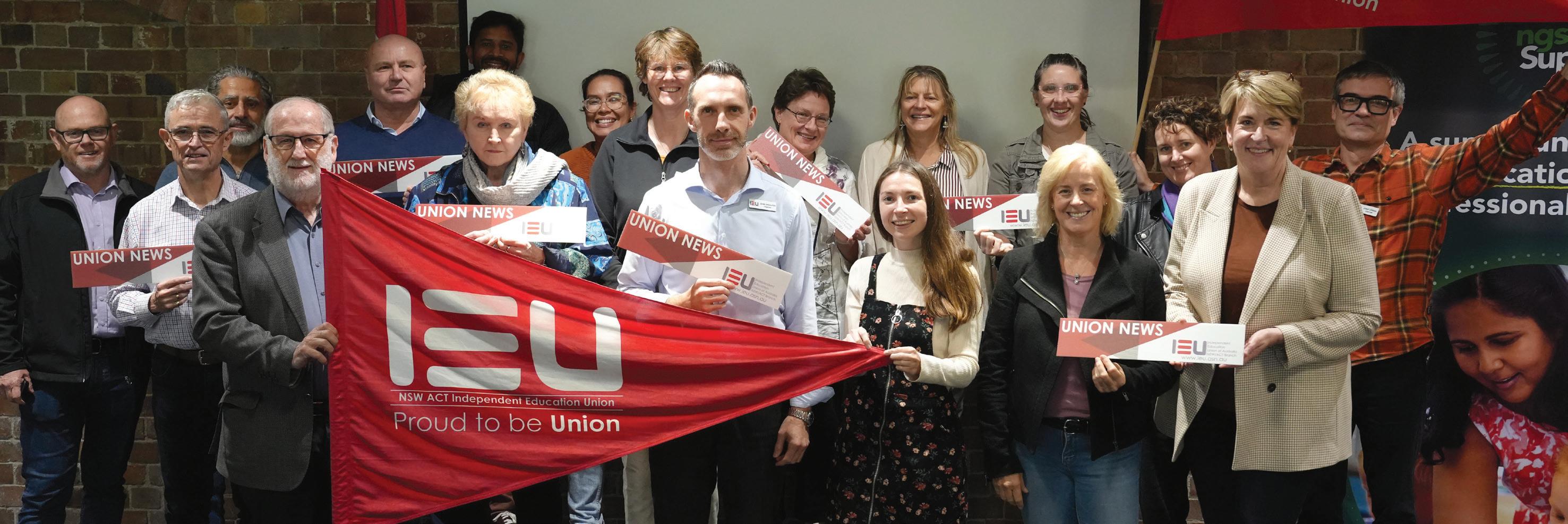
Early childhood education and care
Our members in early childhood education and care (ECEC) have had a year of successes.
We lodged an application for supported bargaining for teachers and educators in long day care in June 2023. The terms of the new multi-enterprise agreement – on the verge of being made as Newsmonth goes to press – have been the subject of intense negotiations over the past 12 months. The federal government’s announcement of funding (referred to above) in August has been critical to the outcome.
At the same time, negotiations are proceeding for the NSW community preschools supported bargaining agreement, as well as enterprise agreements for single employers. Our group of ECEC ‘ambassador’ members have been instrumental in delivering the union message both to their colleagues and the community.
Our ECEC organising team has also been engaged in numerous consultations with state and federal agencies to address teacher workloads, teacher attrition and issues relating to teacher accreditation.
Professional engagement
Deputy Secretary David Towson has filled the vacancy on the NESA board created by the resignation of Veronica Yewdall (now Assistant Federal Secretary). Veronica has done an outstanding job on the board representing our branch. She has provided ongoing support to the branch on professional issues in her federal role.
Professional Engagement Coordinator Pat Devery continues his role at NESA Committee level, and is a driving force in engaging with NESA.
The union is also delighted with the recent
changes to requirements for accredited and elective professional development (see p 12) and will review the demand for our own PD offering to members considering these changes.
As in previous years, Professional Officer
Liz Finlay has supported members in nearly 40 independent schools seeking accreditation as experienced teachers through the Independent Schools Teacher Accreditation Authority.
And Pat Devery has also led the delivery of union training, a program which has expanded with the new delegates’ right provisions.
Media and communications
Media coverage on radio and TV and in print, media releases, press conferences, social media, digital communications, resources for organisers and traditional print publications are all part of the IEU’s story this year.
Our new website, launched in December 2023, is much easier to navigate. The IEU’s communications team is developing strategies to expand traffic to the website – nearly half a million page views by 100,000 users in 12 months is a great result. Another ongoing focus is developing and evaluating the most effective ways to communicate with our members.
Social justice issues
Wages and conditions will always be the union’s core business, but members also expect us to be active and informed on a range of social justice issues. The union’s Women and Equity Committee, the Aboriginal and Torres Strait Islander Advisory Committee, the Environment Committee and our other social justice all contribute towards these activities.
The union is committed to ensuring all of our forums are accessible and relevant to members.
We thank members who give up their time to support these campaigns and activities.
Regional offices
Our regional offices in Lismore, Newcastle and Canberra are thriving hubs of activity for our members.
Our staff in Lismore have only been back in the office since Term 2, following the devastating floods in Lismore in February 2022, which severely damaged our first-floor office and much of the Lismore town centre and surrounds.
Dealing with the initial loss and heartbreak, then the tedium and practical problems of working remotely, as well as the need to oversee the repair and refurbishment of the office, has been very trying. We thank our Lismore staff and members in the region for their commitment and resilience during this difficult period.
Our Canberra staff deal with a plethora of issues, given they are responsible for representing the union on ACT government agencies as well as other organisations such as Unions ACT. They also organise members in three sub branches across NSW and the ACT.
Long-standing organiser Berna Simpson retired at the end of 2023 and her wisdom and commitment in representing members is sorely missed, but she has been ably replaced by Angela McDonald, formerly Vice President ACT on the IEU Executive. We also thank office manager Susanne Radnidge, who left the union in June, for her hard work on behalf of members.
As always, our Newcastle office is deeply involved in the local community of non-
government schools and early childhood centres, leveraging these connections to achieve outstanding membership density and a high level of activism among members.
Sub branch officers and members actively participate in Hunter Workers, the local trade union organisation, to build connections with the broader union movement. The office has represented members in a range of disputes including, most notably, strike action on behalf of members employed in the MaitlandNewcastle Catholic Schools Office. This was a complex dispute, with the organiser untiring in trying to achieve the best outcome for members.
IEU operations
The union needs to evolve continually and improve the effectiveness of our operations. The IEU now offers automatic deduction of union fees from members’ bank accounts, timed to coincide with pay cycles. If you would like to take up this option, please call us on 8202 8900 and ask for the membership team.
70 years strong
In this, our 70th year since the Assistant Masters’ Association was established, I would like to thank all IEU staff for their commitment and work on behalf of members. The achievements of the past year would not be possible without our great team. This includes our 22-member Executive and more than 70 staff.
Most importantly, thank you to all our dedicated reps and members for their support.
Carol Matthews Secretary
More than 100 delegates at the union’s quarterly Council meeting in August passed four motions calling on employers to adopt a zero-tolerance policy towards violence and harassment in schools.
The four motions called on employers and government to: adopt a zero-tolerance policy towards harassment in the workplace so that every employee is protected from harassment by all members of the school community and feels empowered to report incidents without fear of retaliation • provide formal confidential reporting channels, prompt and thorough investigations, clear communication with the victim throughout the process of the investigation, and appropriate actions against perpetrators implement mandatory training for all employees and students to raise awareness about harassment, its impact, and strategies for prevention and intervention, including when students are the perpetrators; and develop and enact explicit workplace policies and procedures with regard to student offences against teachers, including clear definitions of unacceptable behaviours, reporting mechanisms, and consequences for students involved in such incidents.
Work in progress
After the Council meeting, the union wrote to all Catholic dioceses and the Association of Independent Schools requesting meetings to discuss what measures they have in place, and any other steps needed to ensure a safe workplace.
“We need to bring these issues out into the open, so we can understand the prevalence of incidents in non-government schools and address it,” IEUA NSW/ACT Branch Secretary Carol Matthews said.
On 1 October, the union released a statement to the media calling on non-government employers to provide clear data on the rates of violence in schools. The Sydney Morning Herald recently reported on new figures from the NSW Bureau of Crime Statistics and Research showing that in the year to June, there had been almost 2300 assaults occur on public and private school premises, which was only just below 2460 from the year before (see: bit.ly/ harassmentSMH).

NSW MP Sally Quinnell, Labor member for Camden, addressed the IEU’s AGM on 26 October. She spoke about her career as a music teacher before entering NSW Parliament, and delivered a speech on behalf of the NSW Deputy Premier and Minister for Education, Prue Car. Below is an extract from her address.
“Until March of last year, I was a classroom music teacher and I’ve been a proud member of various teachers’ unions since I started teaching in 2001,” Quinnell said.
“I’m a proud product of independent and systemic education – I was a music teacher in the private sector, the Catholic systemic sector and the public sector, and I’ve taught students from prep through to year 12. I’ve also run a business as a music educator.”
Message from Education and Early Learning Minister Prue Car
On behalf of the Deputy Premier and Minister for Education Prue Car, Sally Quinnell said: “Our government promised that you as teachers would be valued as the true professionals you are, that we would show you the respect you deserve. So today, I want to speak directly to you in outlining a significant step we are taking to restore that trust and to demonstrate our respect for you.
“Professional development has always been at the heart of your practice. Even before it became mandatory, it was simply what teachers did. As the architects of learning, you are the experts in identifying the tools and resources you need.
“Our members are reporting increasing incidents of violence and sexual harassment by students directed towards teachers and other staff in schools, and we are calling on their employers to produce a clear picture of what is happening and what they’re doing about it,” IEUA NSW/ACT Branch Deputy Secretary David Towson said in the statement.

It’s a very serious issue. Reports show incidences of violence and sexual harassment are increasing across both government and non-government schools. But we simply don’t have figures for the non-government sector – they’re not disclosed. So we’re seeking meetings with the employer groups.
“This problem is escalating in all school sectors and it is unacceptable.”
On ABC Radio Canberra, Towson highlighted the lack of data on incidents in the independent school sector and the need for clearer information to address the problem.
“While some schools are starting to implement programs like student surveys and staff training, more proactive measures are needed across the sector to ensure a safe working environment for teachers and support staff,” he said.
The IEU has met with several dioceses, with more meetings planned in coming weeks to discuss data disclosure, policies and action on this issue in schools.
Federal funding to support school-aged boys
On 17 October, the federal Labor government announced it had allocated $3.5 million to develop three projects to encourage healthy perceptions of masculinity among school-aged boys: Empowering Boys to Become Great Men: The Man Cave
The Common Ground Project: Future Fit Masculinities – a consortium led by the Foundation for a Positive Masculinity Active Respect: The Men’s Project (Jesuit Social Services).
These projects aim to encourage healthy, respectful. relationships among school-aged boys by influencing and changing attitudes and behaviours that may lead to genderbased violence.
“Through the delivery of positive, educational workshops in schools, we can evaluate and determine what approaches are effective in encouraging healthy expressions of masculinities among school-aged boys,” said federal Minister for Social Services
Amanda Rishworth during a visit to the Man Cave, a preventative mental health and emotional literacy charity, based in Melbourne, on 17 October.
Sue Osborne Journalist
Monica Crouch Journalist
“Professional development should not be about ticking boxes. It should actually be about adding value to your practice and the impact you have on your students. It should bring value to your classrooms.
“But unfortunately, like many things that happened in education over the past decade, the value of professional development was eroded. It became overly restrictive. Instead of supporting you, it imposed burdensome constraints that added workload pressures. And it detracted from the focus on actual learning and development.
“It meant that so much of the valuable professional development that was relevant to your individual needs and enhanced practice could not actually be counted, meaning all of you are, no doubt, doing far more than the 100 hours of PD that is required.
“So we are removing those restrictive professional development requirements. There will no longer be categories of accredited and elective PD.
“We are trusting teachers to choose the professional development that suits their needs. In short, we are respecting you as the professionals you are.
“Under the changes we are making, teachers will now be able to identify their own PD activities, as long as it aligns to one of the seven professional standards – not the 37 standard descriptors, but the seven Australian Professional Standards for Teachers. What this means is we are scrapping the requirement for 50 of your 100 hours to be accredited to PD in mandatory priority areas.
“On top of this, teachers will also be able to count any compliance training towards the 100 hours, as long as it aligns to the standards.
“The other big change is that teachers will no longer have to write lengthy and time-consuming evaluations for the PD you complete. All that will be required is a record of the PD you undertake.
“However, there will still be some oversight and guidance from NESA. We do need to ensure that there will be a level of accountability in the quality of PD that is being undertaken. There will be a framework that will support teachers in identifying effective PD. There will also be a list of recognised PD providers, which will act as a guide for teachers, and will be overseen by an expert advisory panel.
... “We would expect to see in the coming year, a focus on the new curriculum rollout as it comes into effect, and I know the independent and Catholic systems will have clear expectations for teachers in those sectors.
“The changes we are making are probably the most significant reforms to professional development in NSW in 20 years, they bring NSW back in line with the rest of the country, and ensure that every hour of professional development you do is relevant and valuable –valuable to you and to your practice, and valuable to your students.”
The IEU was delighted to welcome ACTU President Michele O’Neil to speak at our National Conference in late August.
Michele attended Catholic schools but confessed she wasn’t the best student: “In fact, I was a shocker,” she said. “Although I loved to learn, I really loved trouble a whole lot more.”
Michele said she was fortunate to have teachers who understood her. “There were a couple of teachers in my school, particularly English and history, who appreciated the elements of me that were about challenging the status quo,” she said.
“Those teachers supported me and nurtured me, and I hold them close in my memory, and how they helped shape who I’ve become today.”
Michele had nothing but praise for IEU members. “The work you do every day, in terms of educating our future as a nation, is such important work and so often undervalued by bosses and governments,” she said.
“But you’ve built this understanding that the work you do is essential work – and traditionally undervalued work, but we are on a path to change that. And your union is part of leading that change.
“You’re making sure we think of the work of early childhood educators, primary school teachers, secondary school teachers, teachers in the TAFE system, or in higher education – all of the different ways we educate people – as some of our most valued work.
“And we’re better as a society and better as a community when we do value it. And if we value it, we have to pay you properly for it,” she said.


The IEU joined federal Minister for Employment and Workplace Relations Murray Watt at St Francis Xavier College, Florey, ACT, for a press conference to mark the new right to disconnect coming into force on 26 August.
“Clocking off used to mean something, but now technology means that many teachers are feeling pressured to respond to emails late into the night,” Minister Watt said.
“The Albanese government’s new legislation means workers can’t be punished for not responding to unreasonable requests at work. A well-rested educator is a better educator.”
IEU rep Jacob Betts, who is also the Science Coordinator at St Francis Xavier College, said: “Professional obligations and expectations have been encroaching on our personal time for many years, and this ramped up during the pandemic period.
“Teachers are already carrying heavy workloads. We need the right to disconnect to protect our wellbeing so we can in turn look after our students. It will help prevent burnout by enabling a better work-life balance so we can enjoy uninterrupted time with our own families and friends in the evenings and on weekends.”
Betts was introduced by St Francis Xavier
Principal and IEU member Sandra Darley, who spoke of her support for the right to disconnect.
IEUA NSW/ACT Branch Secretary Carol Matthews said: “As of today, school staff will not have to be available to respond to calls or emails from parents or students in the evenings or during weekends, and they will not have to respond to non-urgent emails from their principal or employer. They can draw a line in the sand.”
The right to disconnect was passed in February this year as part of the ‘Closing Loopholes’ changes to the Fair Work Act, aimed at enhancing the rights of working people, which also included stronger rights for union delegates.
Two months on, Betts says the significance of the new right so far is that it’s down in black and white. “Many schools support the spirit of it, but getting it in writing to make sure you’re covered gives the security of knowing you’re supported if something comes up on a weekend and you haven’t responded,” he said at the IEU’s AGM on 26 October.
“Many of us find it hard to step away, so it’s good to know we’re protected when we do.”
He noted that some schools have adopted an auto-reply option for weekend emails that includes an emergency contact.
On 14 October, ABC TV news interviewed IEUA NSW/ACT Branch Secretary Carol Matthews about NSW independent MP Alex Greenwich’s decision to drop antidiscrimination protections for LGBTQIA+ teachers, school staff and students from his Equality Bill.
Under current NSW anti-discrimination law, non-government school employers can discriminate against school staff by terminating their employment because of their sexual orientation or transgender status. They can also discriminate on the grounds of gender, disability, and marital status.
While the union recognises the right of faith-based schools to build a community of faith, staff in those schools are also entitled to protections at law.
“Our members are also an important group who need human rights, so we are bitterly disappointed [by Mr Greenwich’s Bill],” Matthews said on ABC TV news.
Mr Greenwich dropped the proposed protections from his Equality Bill citing
a review of the NSW Anti-Discrimination Act 1977, referred to the NSW Law Reform Commission by the NSW Labor government in July 2023.
“But we are disappointed Mr Greenwich did not consult the union representing the teachers and school staff who are impacted by his decision,” Matthews said in a statement to the media.
“There are no guarantees this longrunning review will recommend protections for teachers and school staff in faith-based schools.
“We believe our members deserve the same protections as the wider community.” Mr Greenwich subsequently reached out to the IEU to request a meeting, to be held on 13 November (after Newsmonth went to press).
The Equality Bill passed NSW Parliament on 17 October.
The IEU will continue to lobby the NSW government for anti-discrimination protections for our members.


The IEU celebrated its 70th anniversary at its AGM on 26 October. Elected officials past and present reflected on many memorable moments of making gains, building strength and standing strong with members for seven decades. Here are some excerpts from their speeches.



Glenn Lowe President
We are proud to celebrate the 70th anniversary of our remarkable union at the IEU’s 2024 AGM. We marked this important milestone with insightful presentations from esteemed guest speakers who highlighted our rich history and the substantial growth we’ve achieved over the decades.
The contributions of the speakers on this page serve as a powerful reminder that our strength lies in unity – and numbers. Together, we’ve built a resilient community that advocates for the rights and wellbeing of our members.
As we reflect on our past, it’s clear that ongoing growth is essential for the advancement of our union. It enables us to improve working conditions and pay rates for our members.
We must continue to raise our voices at every opportunity, ensuring we are heard loud and clear. Let this anniversary inspire us to forge ahead, united in our mission to support one another and advocate for positive change.


Carol Matthews Secretary
I’d like to express my appreciation for the work of our staff, members, reps, Council delegates and Executive members, who have all made the IEU such a vibrant union. We have so many different membership groups represented amongst us and that’s just fantastic.
When you think about where we’ve been and where we’re going, you only have to think about the 2022 campaign in Catholic systemic schools, the current campaign we’re having in Christian schools, and the campaign in independent schools, to see how far we’ve come in terms of the breadth of matters we’re dealing with.
We’re active across all parts of our membership, and that’s really a reflection of the commitment of our members in those sectors. When we started, it wouldn’t have been possible to envisage the level of activity that we have now.
I can’t help but think back about our growth as a federal union. In the mid-80s, we were just a loose association of state-based unions. We then became a national union, and that was really due to the work and commitment of Patrick Lee, who was the Federal Secretary, and who really drove us to be registered as a national union.
It’s hard to contemplate now, when you think about how we think of ourselves, we think of ourselves as part of a national union. The secretaries talk to each other, we plan national campaigns, our organisers and industrial officers meet. There’s just so much more unity of commitment and purpose than could ever have been imagined.
We’e had 70 years of history but we’re also looking forward. We’ve endorsed a Strategic Plan to help us grow for the next 70 years and to build on our strengths and help us do the very best for our members.


In February of 1972 I had the honour of becoming the first full-time General Secretary of what was then AMMA, the Assistant Masters’ and Mistresses’ Association.
We are celebrating 1954 as the union’s commencement date but I would argue that 1958 – that is, four years later – is a more important date. That was when we [were registered] as a trade union, entitled to approach relevant courts and commissions on behalf of our membership to achieve social justice through awards, working conditions, reinstatements and the like.
It was the year we became a trade union capable of covering educators in a wide range of non-government education institutions, a union that had now gained a capacity to seek social justice, supported through law by court orders.
So the history of the Independent Education Union of Australia started with a small coffee group of assistant masters, but over 70 years, it has become one of the most effective and respected – even in legal circles – achievements in NSW, Canberra and throughout wider Australia.
Those achievements were initially started by a few – a few that I was fortunate enough to be part of.
Those of you here today replaced earlier cohorts of the AMA [Assistant Masters’ Association], the AMMA and the Independent Teachers Association. You are no doubt more experienced, more skilled and more informed than we were, but if I may respectfully say so, no more dedicated than we were in striving for social justice.
So tonight, those of us who have long been members join with the current membership in celebration of 70 years’ work by the IEU. Bearing in mind I am probably the oldest person in this room, and I believe I hold a membership card longer than any other person in this room.
If I may say, I am so proud of what you have done, what you have achieved. My thanks, my congratulations. This is a history well worth telling.
I’ve witnessed the display of industrial agility, the creativity and robust advocacy necessary to steer the union through such significant shifts as collective bargaining, enterprise bargaining, and the profound challenges of the new national industrial structure. I’ve witnessed the embrace of the challenges of greater diversity and First Nations peoples within the union’s own structures and throughout the sector.
I’ve witnessed the ongoing brilliance of the information and skillful advocacy in that wonderful rag, Newsmonth, since 1981, NewsExtra since 1983, and your professional journal, IE magazine. Most of all, I’ve witnessed the continued defence of the rights of individual teachers and the advancement of the noble and ever more difficult profession of teaching.
Throughout all those 35 years, I have remained so very proud of this union, proud of its members and the incredible work that they do every day. I’m proud of the energy, advocacy, agility and comradeship.
There is so much to be proud of, and I congratulate you all.
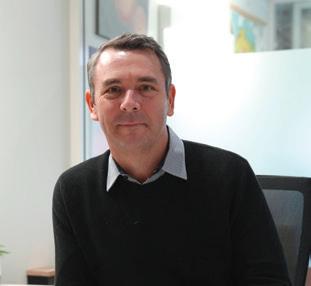

Seventy years of union success is definitely worth celebrating. The NSW/ ACT Branch of the IEU has always played a crucial role on the national stage. Your membership density and collective bargaining success are the envy of many unions, both within and outside the education sector. You continue to punch well above your weight and build union strength far beyond national levels.
Seventy years! Think for a minute about the battles you’ve fought in this time: anti-union laws, hostile employers, legal threats. You not only stared down these attacks but grew to be one of the strongest unions in any sector in the country.
On a personal note, I extend my appreciation to your branch leadership team of Secretary Carol Matthews, Deputy Secretary David Towson, Assistant Secretary Lyn Caton, Assistant Secretary Amanda Hioe and President Glenn Lowe.


General Secretary, 1981-1989
In 1977, I was appointed the first organiser, provided with a brand new Toyota Corolla hatchback, and set out wandering around NSW, looking for schools. We didn’t have lists. I’d turn up at schools, wandering in at what I thought was lunchtime. I’d get up before the staff at lunch. “I’m from the union,” I’d say, “and here’s what I want you to know”.
Since I left in 1989 to set up the national welfare rights movement, I have keenly observed this union’s ongoing, stunning achievements over which all of you have presided.
I’ve witnessed the continued growth and expansion into an industrial union taking in the much-neglected clerical staff in our schools.
I’ve witnessed the relentless commitment to serving the best interests of members.
I’ve witnessed the ongoing commitment to the engagement of members through the hard fought for and unique decision-making and governance structure – chapter, sub branch, Council – never to be underestimated or taken for granted. I’ve witnessed the long tradition of women in the role of president over many years.
And to your branch more broadly for the leading role you’ve taken in first winning, and now embedding, new workplace laws. These laws now benefit all Australian workers, and you were front and centre to make it happen.
Your branch delivered an amazing delegate to front a Senate inquiry on why we needed new delegates’ rights. Your branch delivered a preschool teacher to lead a media and lobbying blitz on why we needed fairer bargaining laws. Your branch delivered a primary school teacher to share her personal stories with parliament on the serious challenges impacting the profession.
And with just two days’ notice, you delivered an entire school in the ACT so the federal Workplace Relations Minister and the media could meet with education workers to discuss our newly won right to disconnect.
Whatever’s been needed, your members, your union leadership team, your officers and union staff have exceeded expectations.
And now your branch is a national leader in using these new rights. There have been just three supported bargaining authorisations in the entire country, and your branch has won two of them: the long day care wages outcome; and your ground-breaking NSW community preschool negotiations that will benefit members in over 100 preschools previously locked out of bargaining.
You have, and continue, to lead the charge. All unions stand to benefit from your activism and collective power.
So, finally, thank you. Congratulations. And cheers – happy birthday to a great union.


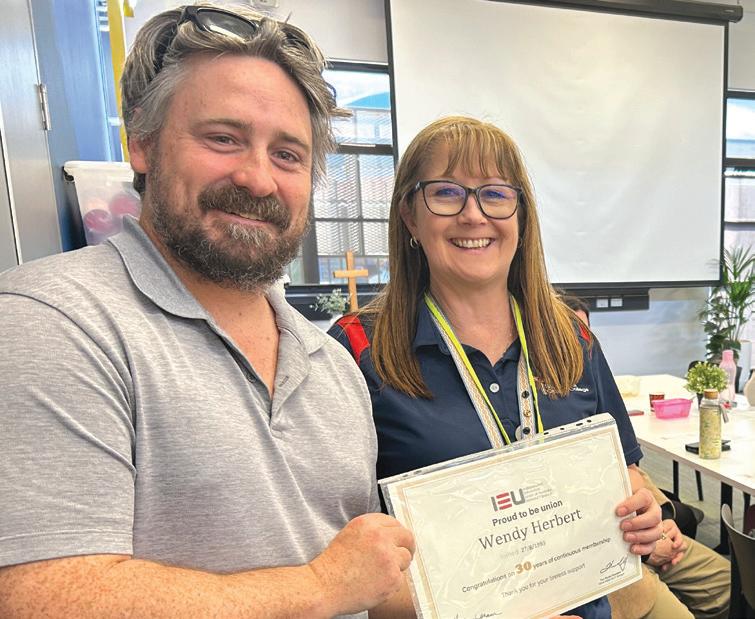



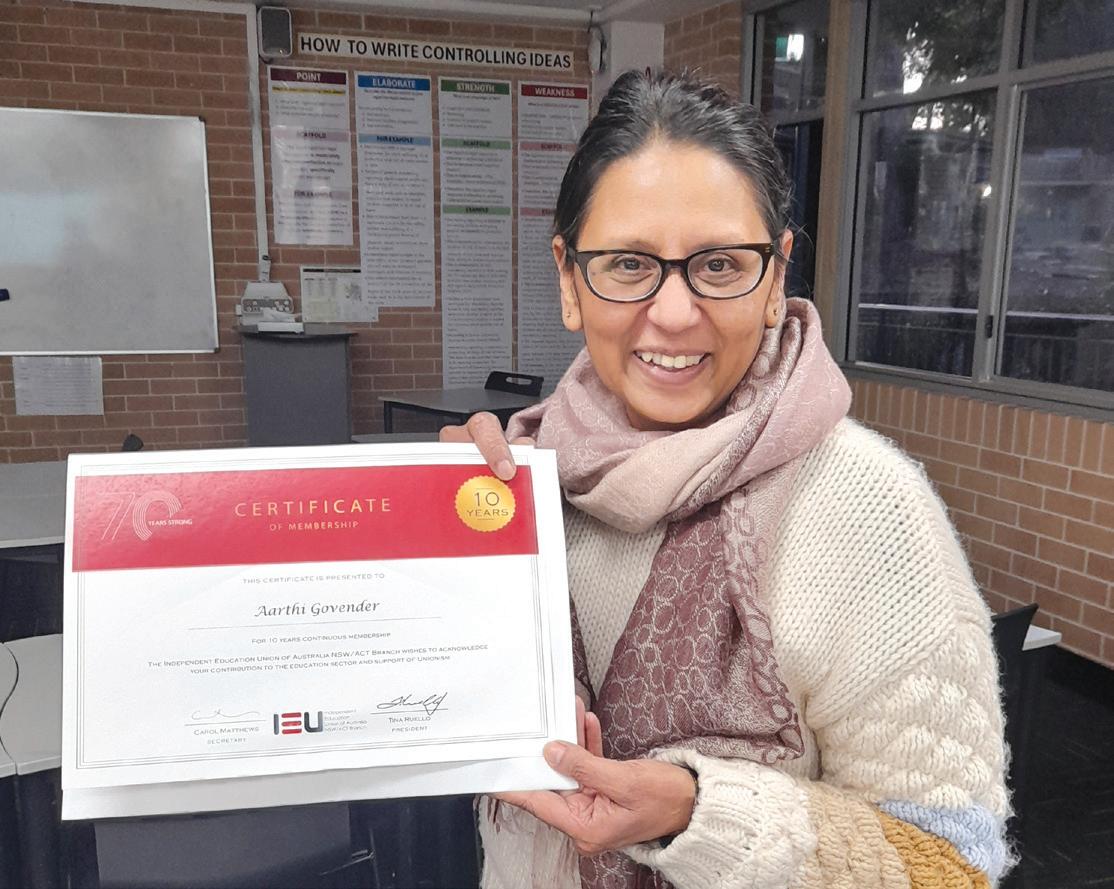




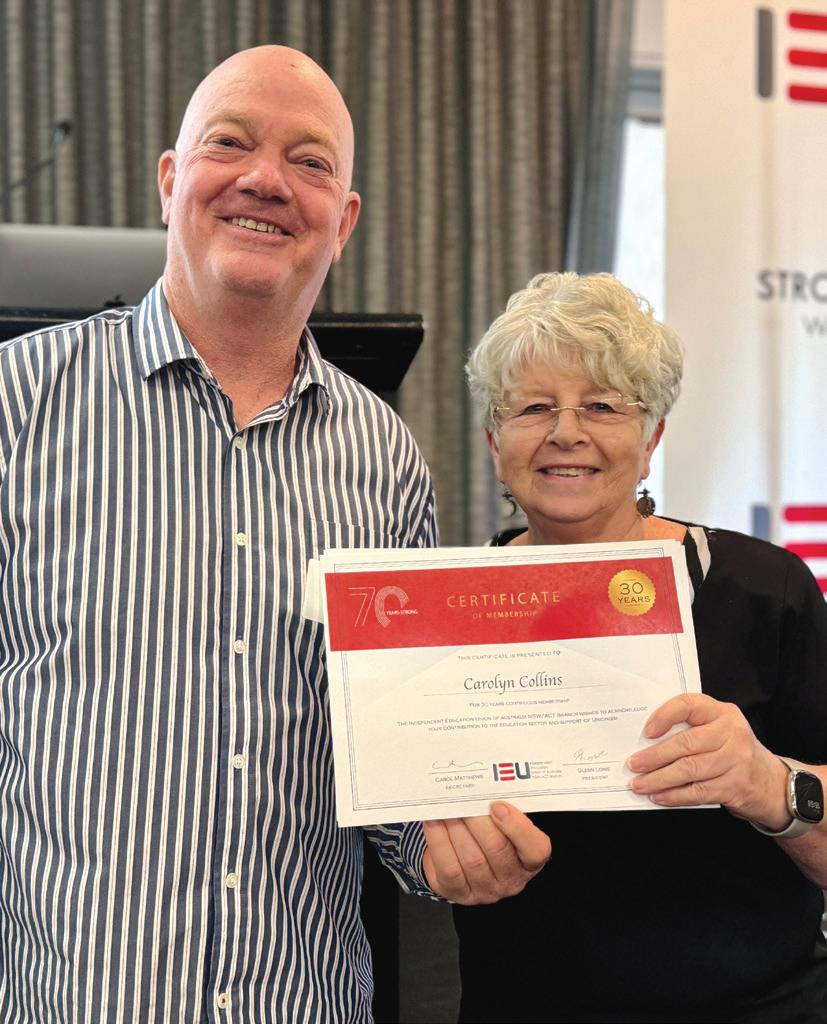
If you’re a serial TikTok ‘doom scroller’ like me, you may have come across a radio shock jock giving teachers an F-grade for our perceived inability to improve NAPLAN results.
Usually, I keep scrolling – it won’t be the last time our profession is made a mockery of in the media. This time, however, I couldn’t move on without commenting.
In my career, I have witnessed a multitude of changes in teaching – the impacts of COVID-19, the teacher shortage and the fight for resourcing and pay, to name a few.
Our profession has become a topic of conversation on every platform. We’re judged by people who have read one article and are suddenly experts on education.
A single article is referenced throughout the TikTok piece. The article states that “NAPLAN scores show one in three Australian school students is performing below literacy and numeracy standards”.
It also states: “Action is needed, with the Commonwealth currently locked in negotiations with states and territories for a new decade-long agreement for public school funding.”
Had this shock jock read the entire article or done a little more research, they would have found that it’s inequity in the system that has a profound impact on NAPLAN results.
In an article published in the Australian Financial Review on 14 August, Jordana Hunter and Nick Parkinson from The Grattan Institute wrote that rather than throwing money at the problem and hoping for change, greater discussion around how we manage these inequities is required at a ministerial level.
Considering these factors, it’s obvious that student outcomes should not solely be based on standardised testing like NAPLAN. For such a test, students as young as seven must sit in silence and answer questions that (due to the nature of our curriculums and the immovability of NAPLAN) may not have been covered in class.
The same test does not allow regular student adjustments as the integrity of the test must be maintained, “even if this is what happens during a student’s regular lessons”. We can’t support students the way we normally would, but our performance is based on this same test?
So, Mr Shock Jock, see how more research might have led you to a more enlightened view?
You choose to sit in your car ranting at your phone and ‘rage-baiting’ a community of professionals who are not personally responsible for the decline in results.
This commentary in mainstream media makes partnerships with parents and communities difficult.
While the mainstream message is that teachers are responsible for every single aspect of child development, it’s hard for stakeholders to be on the same page, which would have greater impact on our students.
Shannon Matthews IEU member
See also President’s Report, page 2

At the IEU’s August Council meeting, Macquarie University economist Professor Sean Turnell and activist Tasneem Roc from the Myanmar Campaign Network provided an update on the dire situation in Myanmar.
Detained on 6 February 2021, less than a week after the military junta staged a coup, Turnell spent 650 days in some of Myanmar’s most notorious prisons.
In overthrowing the democratically elected government, the coup sparked widespread protests and civil disobedience movements across Myanmar. These were met with a violent military crackdown, leading to numerous casualties and arrests.
The power of books
Professor Turnell shared his personal experience of relying on reading to cope with the challenges of being imprisoned. “Books saved my life,” Professor Turnell said. “I had a very eclectic range of books over the whole time I was there. I got 127 books sent to me from all around the world, and I left them there so that they’re now part of the prison library.”
On returning to Australia, Professor Turnell has published two books: An Unlikely Prisoner and Best Laid Plans
Boycotting the regime
Tasneem Roc talked about how health workers were the first to openly defy the military junta by boycotting state-run hospitals and participating in strikes. Their role in the civil disobedience movement was pivotal. “Over 400,000 government employees

We invite all members to enjoy the third and last edition of IE magazine for 2024, packaged with this issue of Newsmonth. Hear from human rights advocate and former Socceroo Craig Foster AM on the power of education, the importance of unions, and his hopes for the Matildas. (To win a copy of Foster’s book, see page 20.)
When school teachers can’t access childcare for their own children, they can’t return to the classroom as planned. We hear from members in rural and regional areas who are struggling with the workforce crisis in early childhood education.
Elsewhere, we explore how online pornography is undermining consent education and what schools can do about it.
We also look at what happens when students cyber-bully staff and how to tackle it.
Find out about new research on the need for more First Nations teachers and better career pathways in the NT.
An exciting oral history project is giving women unionists the chance to tell their own stories. Read about the important role women have played in the history of Australia’s union movement.
Finally, don’t miss our special four-page liftout on workloads.
from the education system joined the civil disobedience movement, as well as engineers, bank workers, railway workers and many other civil servants with nearly 10 million students boycotting the regime’s education system,” Roc said.
The situation in Myanmar remains dire. More than 5350 civilians have been killed, including 678 children. There are more than 3 million internally displaced persons living within Myanmar and over 1.3 million refugees have fled to neighbouring countries.
Half of the population is now living in poverty, primarily due to the escalation of violence since the military coup.
A motion from the union
After Professor Turnell and Tasneem Roc spoke, the IEUA NSW/ACT Branch endorsed a motion in support of the work of the Myanmar Campaign Network:
The Council of the IEUA NSW/ACT Branch acknowledges and congratulates Professor Sean Turnell, Tasneem Roc and the Myanmar Campaign Network for their unrelenting efforts in supporting the people of Myanmar in their struggle for workers’ rights and democracy.
Council calls on the Australian Government to support the Myanmar Campaign Network in its efforts to bring further pressure on Myanmar’s military junta to end systemic human rights abuses and to bring about the restoration of democracy.
For more information, visit: myanmarcampaignnetwork.org
Katie Camarena Journalist

At its meeting in August, IEU Council noted the retirement of the IEU Teacher Exchange Program and expressed its thanks for the many years of memorable exchanges. The NSW Department of Education has also retired its exchange program.
The IEU program ran for nearly 40 years, with schools in Canada, the US, the UK and Europe participating. Council acknowledged the overseas and state exchange coordinators, as well as the NSW Exchange Teachers League, and all the overseas exchange leagues including Alberta, British Columbia, Ontario, Colorado and the UK.
It also acknowledged IEU Exchange Coordinator Helen O’Regan for her support for the thousands of IEU members who took part. Some comments from members who have been on exchange:
“Very sad that this chapter is closing. But it cannot take away the memories, experiences and friendships made.”
“I’m so happy for the life-changing experience
so many of us had through exchange and so sad that no more teachers will have the same opportunity.
“I will be forever grateful for my unforgettable exchange experience in Calgary.”
“The opportunity to live and work overseas is something that should be afforded to every teacher, and I will always be so grateful for my turn in 2007.”
“Our family was blessed to have had such an amazing opportunity, and we are forever grateful.“
“Vancouver 2008 will live on in my memory as one of the most amazing years I’ve ever enjoyed, and you played an integral role in that.”
“All of us who have been involved over the years have had many happy times and have made many fine friends through the exchange program. How sad it’s not there for current and future teachers.”
The IEU has a history of supporting social justice campaigns, including those that protect the rights of First Nations people. On the weekend of 12-13 October, the IEU, along with other unions, farmers and community-based organisations stood with the Gomeroi people in their opposition to Santos’s Narrabri Gas Project and the Hunter Queensland Gas Pipeline.
The Picket the Pipeline convoy travelled from Narrabri to Newcastle along the 400-kilometre route of the proposed Hunter Gas Pipeline. Community gatherings and rallies were held in Gunnedah, Scone, and Singleton.
The event concluded at Civic Park, Newcastle, where Gomeroi elder Suellyn Tighe said, “This fight is a David-and-Goliath fight and we, the Gomeroi nation, are fighting against deep pockets, fossil-fuel companies whose only drive is the bottom line.”
No stronger fight
Gomeroi Traditional Custodian Karra Kinchela travelled from Narrabri to address the rally. “I cannot express my humbleness at the support of the unions that support our right to selfdetermination, a right to a healthy environment, our right to speak,” she said. “Just to know that people all over Australia care about our country, our people’s stories, our values, our future, our education, and jobs for our kids, for the future. We’ve got farmers, we’ve got city, we’ve got the country, we’ve got our workers – you can’t get a stronger fight than this.”
Unions NSW Assistant Secretary Vanessa Seagrove told the crowd that the Gomeroi people “have continually protected the Pilliga, it is only right that we stand with them”.
Stewards of the land
Kylie Booth-Martinez, an Aboriginal Education Worker and member of the IEU Executive, spoke about the spiritual and cultural significance of the land to Aboriginal people.
“Aboriginal communities see themselves as stewards of the land, tasked with the sacred duty of nurturing and protecting it for future generations,” she said.
“The Gomeroi people have voiced valid concerns about the detrimental impacts of Santos’s activities on their land, water resources and traditional ways of life. This gas project poses a severe threat to water supplies, jeopardises endangered wildlife and will perpetuate decades of climate pollution.”
Shoulder to shoulder
The IEU supports the Gomeroi community in its opposition to Santos. “By standing shoulder-to-shoulder with the Gomeroi, we are advocating for a comprehensive approach to social justice, environmental stewardship and fostering fair and meaningful relationships with our First Nations community,” Kylie said.
“Today, I stand before you as an Aboriginal woman, wanting what is right for my Aboriginal brothers and sisters and what is right for all Australians. I want to educate my students about what is on our Country; not what was once on our Country. The IEU is with you.”
Kylie Booth-Martinez IEU Vice President Support Staff
Katie Camarena Journalist
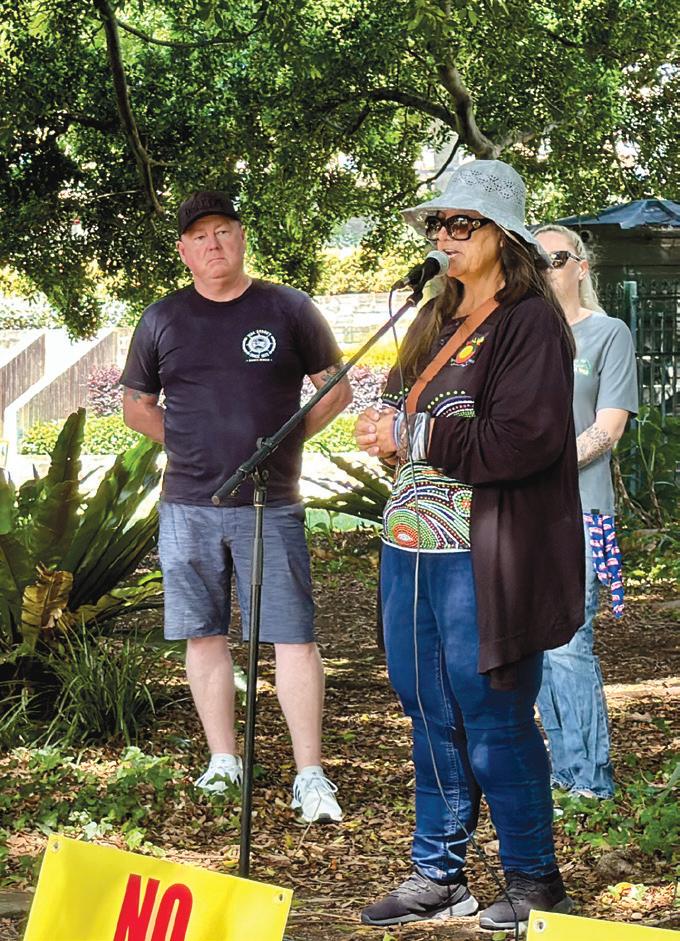
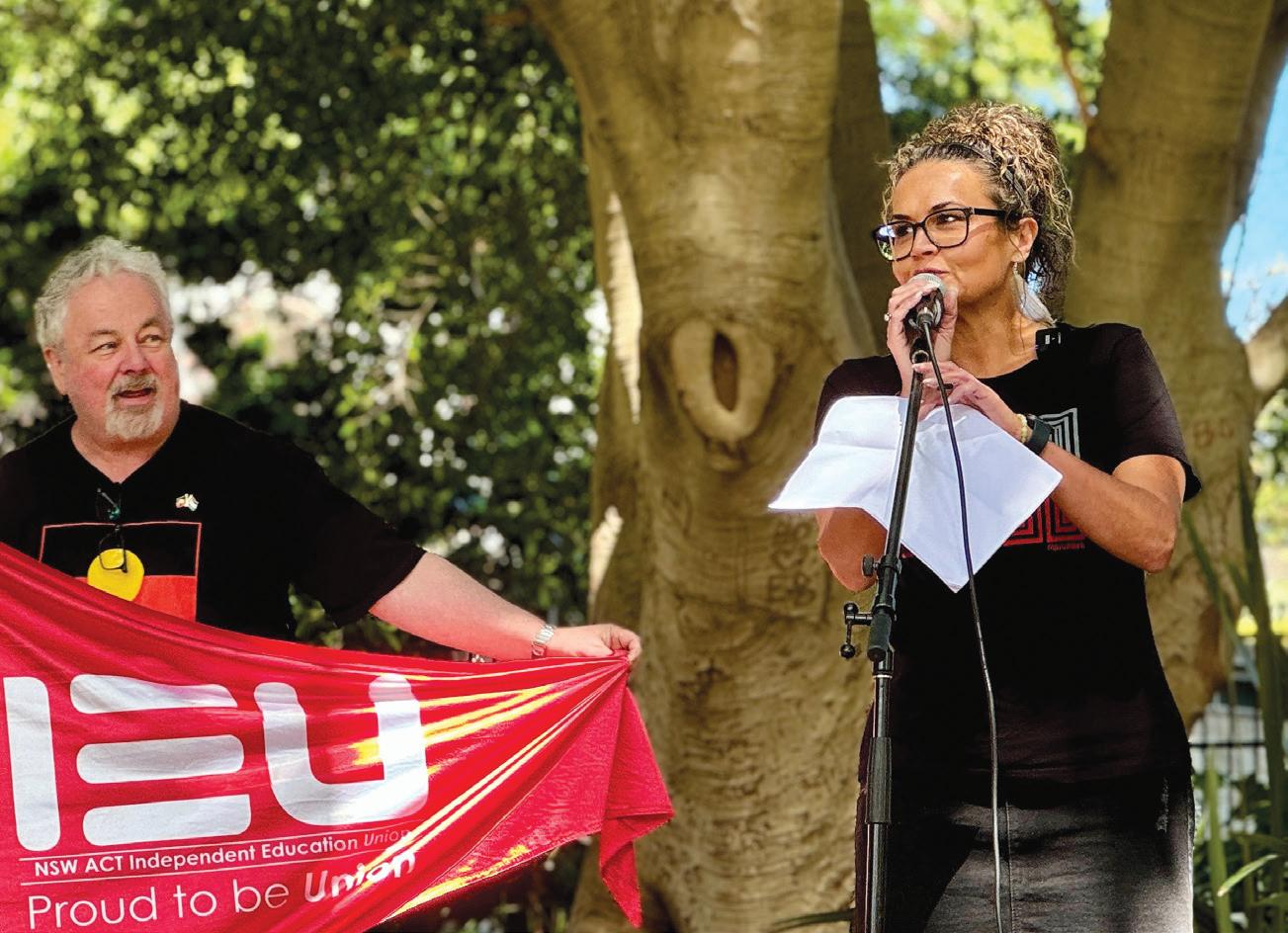
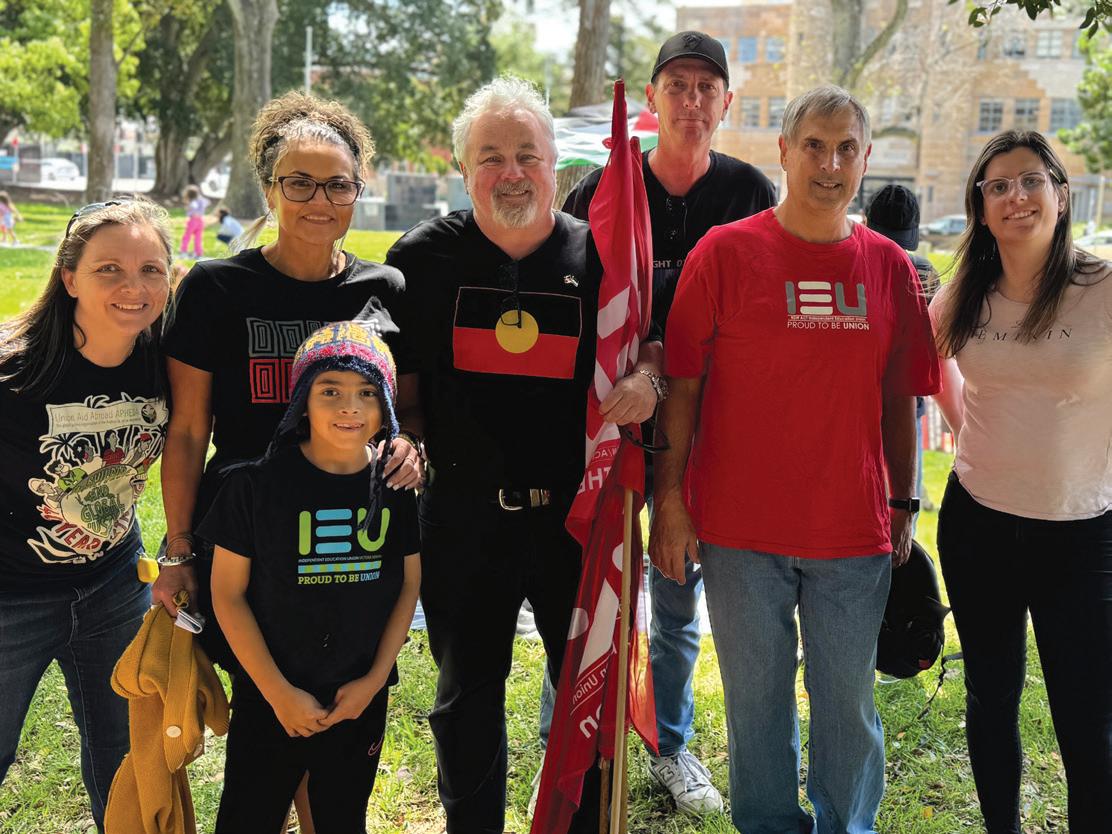


The federal government’s plans to limit and further regulate the international student sector remains the talk of the industry.
The controversial Education Services for Overseas Students Amendment Bill is almost certain to sail through parliament with the support of the Coalition.
The biggest changes have already been announced, particularly caps on the numbers of international students allowed at any given university and caps on some types of courses.
However, the course cap proposals have been watered down to the extent that only non-university and non-TAFE education providers will now to be subject to such limits.
Beyond the nuts and bolts of the changes, however, it does appear that a new era of bureaucratic control in higher education will soon be upon us.
Perhaps the most significant change being ushered in by the amendments is the greater control granted to the Immigration Minister of the day to set caps and rules.
There is definitely an argument that the international education sector needs a shake up, but as noted by Australian National University academic Andrew Norton, these and other changes “signal the demise of student choice and university autonomy”. Where this takes us is an open question.
Australia is not alone in looking to limit the growth of international student numbers.
In recent months, Canada announced a 10 per cent reduction in student visas granted for 2025, and this is on top of an already declining number of visas being granted in 2024. Meanwhile, the UK has also pushed back against international student numbers over the past few years, to the point where student applications have declined by about 16 per cent in 2024.
It’s clear we are currently in an era in which some elements of the electorate are hostile to mass immigration. International students may well present the lowest hanging fruit for governments in terms of raw numbers as well as the potential political or economic blowback. In the age of Donald Trump and Peter Dutton, these anti-immigration pressures are probably not going away any time soon.
‘Dodgy college’ liability
So-called ‘dodgy colleges’ are a common rhetorical prop for those who seek to limit the international student sector, and it’s probably true that the lower end of the market provides some grist for that mill. However, a recent High Court decision should give some reassurance that time has run out for the less reputable operators.
The Australian Competition and Consumer Commission (ACCC) took Captain Cook College to court, alleging “systemic unconscionable conduct”.
The ACCC claimed the college enrolled students using dodgy inducements such as free laptops, and the college removed most student safeguards that would have otherwise allowed students to know what they were getting into.
The college also took advantage of government assistance (the former VET FEE-HELP), which meant that taxpayers ended up picking up the tab for courses that students were not completing, and in some cases couldn’t even access.
The Federal Court found in favour of the ACCC, and this was upheld by the High Court. Furthermore, the High Court found that the directors of the college were directly liable, as they should have known what was going on.
This means that directors will no longer be able to claim ignorance about unconscionable conduct by employees or agents – the buck stops there, after all – which will hopefully help weed out some of the bottom feeders that give the rest of the sector a bad name.
Kendall Warren Organiser
Every year, the IEU invites members from schools, colleges and early childhood centres to apply for a number of grants to develop sustainability initiatives.
The 2024-25 Environment Grants, proudly sponsored by Teachers Mutual Bank and the IEU, have been announced, and include a variety of innovative and exciting projects.
Early childhood education and care Evans Head Preschool Association, Evans Head: Compost Champions
Through developing a culture of composting, children will build an understanding of the environment, sustainability, and reducing waste. Through composting, they will learn about the processes of decomposition, the role of micro-organisms, and the importance of soil health.
Christ Church Gladesville Preschool, Gladesville: Indigenous Multi-Sensory Garden
The project will enable children to experience the benefits of regular and meaningful interaction and immersion in the natural environment. Enhancing learning in resource management and sustainability, the garden will build greater awareness of Country and local cultures through consultation with the Dhurug community.
Primary schools
St Joseph’s Primary School, Taree: Green Roof Pergola
St Joseph’s will build a biodiverse green roof pergola that will attract birds, bees and

other animals and support the reduction of the school’s carbon footprint. The roof garden will support the Community Kitchen, providing food to create meals for the homeless within the community.
St Therese Parish Primary School, West Wollongong: Native Bees in SchoolsStingless Bees, Hive and annual flowers
The school will engage in the stingless bee program and will purchase bees, hives and annual flowers. This will be a co-education program and form an integral part of the overall sustainable environmental program in the school.
Assumption Catholic Primary School, Bathurst: Buwanha Walan (Grow Strong in Wiradjuri language)
The project will see a garden built next to the Yarning Circle and filled with native and bush tucker plants. Students can learn how First Nations people used plants and how they still have significance today, as well as how First Nations peoples cared for the land. They will experience watching something grow (buwanha) through the seasons while learning about the importance of improving environmental sustainability.
Holy Spirit Catholic Primary School, Nicholls: Indigenous Garden
Revamping the existing Indigenous Garden, students will plant new native plants and add seating around the firepit to create a Yarning Circle. Teachers will be able to educate
students about local plants and their uses by Aboriginal people. Aboriginal and Torres Strait Islander students will be involved in choosing plants that are native to the Ngunnawal people and other bush tucker or natives that will suit the environment. The Yarning Circle will be used to learn about and share their culture.
Secondary schools
McCarthy Catholic College, Tamworth: Germination and growing of Native plants for the McCarthy Environmental Regeneration Project
The project aims to increase and foster student interest in the local environment and community and to develop an environmental resource. The project will provide a space to grow local Aboriginal food which will give students greater understanding of local Aboriginal culture while creating habitat for fauna.
Our Lady of Mercy College, Parramatta: Enhancing Marine Education through Underwater Exploration
The project will purchase an underwater digital camera with GPS tagging and snorkelling equipment for students in Years 9-12 to enhance marine studies education. Students will capture and analyse data, fostering environmental awareness, developing technical skills and allowing them to contribute to citizen science. Engaging in realworld geography, students will contribute to a culture of conservation within the school.
Preschool to Year 12
Central Coast Montessori School, Bateau Bay: Water Saver
The school aims to operate at a carbon neutral level, supplanting grid connections with small scale energy generation infrastructure (small scale wind turbines, batteries, solar). Additional water storage tanks will be used for the grounds with filtration to clean the water. Rainwater tanks will maintain a sustainable vegetable garden to serve the local community.
The Armidale Waldorf School, Armidale: Mud, Fibres, Grasses – The Nest Builders
The project aims to regenerate a section of remnant bush that is in the centre of the school’s car park. The school aims to create a habitat zone of food and nesting sites for small woodland birds.
The IEU and Teachers Mutual Bank congratulate all grant winners and we look forward to hearing more about their projects.


People change, circumstances change, life happens. To deal with this, it is important to ensure that your nominated beneficiaries reflect your current wishes as to whom your superannuation benefit (along with a possible insured component) will pass after your death.
In my experience of more than 20 years of managing death claims, I find that most families come together at the time of the death of a loved one. Usually there are no problems or disagreements, if the deceased had nominated beneficiaries who fall within the legal definition of valid recipients for superannuation death benefits. However, there can be disputes or disappointments if this has not been done and disputes after the death of a loved one can be distressing.
In the case of no nomination, a will may be helpful, but superannuation assets are not governed by a will. At best, the will can inform the trustee of the deceased’s wishes.
In this scenario the fund must investigate the deceased’s personal circumstances – was there a spouse or de facto, are there shared bills, a joint mortgage, children (minor or adult)? A decision will then have to be made as to who receives the benefit. This could cause problems, but the decision remains with the trustee. In making a nomination, it is important to remember who can receive your death benefit: your spouse (de facto or legal); any child including stepchildren, adopted or exnuptial children (different rules apply to child reversionary beneficiaries); your estate to be distributed per your will; or a person with whom you have an interdependency relationship. If you have elected to have a non-binding death nomination, the payment will generally be made to your beneficiary as long as one of the above categories is met.
You can also select a binding death nomination which removes any trustee discretion and provides certainty if the recipient is a valid beneficiary and fits the description of ‘dependant’ or your estate. NGS Super offers two types of binding nominations. The first is a lapsing binding nomination which will expire after three years. In this case the fund will notify you that it is necessary to renew the binding nomination every three years to ensure it is up to date with
Secretary Carol Matthews Eora Nation
Deputy Secretary David Towson
Eora Nation
Assistant Secretary Lyn Caton
Dharug Nation
Assistant Secretary
Amanda Hioe
Eora Nation
President
Glenn Lowe
St Joseph’s Catholic High School
Albion Park
Dharawal Nation
Deputy President and Financial Officer
Denise McHugh
NESA Liaison Officer
Kamilaroi Nation
Vice President Systemic
Liz Heggart
Penola Catholic College Emu Plains
Dharug Nation
Vice President Non Systemic
Helen Templeton
St Scholastica’s College Glebe Eora Nation
Vice President Support Staff
Kylie Booth-Martinez
any possible life changes such as a divorce, marriage, a death or the birth of a child. The second is a non-lapsing binding nomination which will not expire. In this case, the member should remain alert to the fact that the nonlapsing binding nomination will remain, even if the member’s personal circumstances have changed. So, for example, if the non-lapsing binding nomination applied to a member’s life situation 20 years ago, it may not represent the present situation.
It is also possible to nominate your estate with a binding death nomination, either a lapsing or non-lapsing one. In this case your benefit will be paid to your legal representative under your will or an administrator if you do not have a will. Most financial advisers would agree that it is better to have a will for the clarity it provides. Different tax treatments could apply if the payment is made to an administrator or to the estate, which would depend on the circumstances of the estate and/or your dependants.
In the busy world of work, families and making ends meet, it’s easy to put aside matters such as beneficiary nomination updates, but it’s not difficult if you use NGS Super Member Online or by contacting the fund.
Also, if you are opening an NGS transition to retirement account or income account, it is important to obtain further information on the rules for how a reversionary beneficiary can be established, as they are complex.
It is important for your peace of mind to update your beneficiary nomination as your life circumstances change. You can contact an NGS Super professional adviser or the Financial Advice Helpline on 1300 133 177. Also if you would like more detailed information, it is possible to find more at ngssuper.com.au/forms (Death benefit nomination form).
Bernard O’Connor (former Company Secretary NGS Super)

Assumption Catholic Primary School and St Stanislaus College Bathurst Wiradjuri Nation
Vice President Early Childhood Services
Michelle Thompson
Shore Preparatory School
Early Learning Centre Northbridge Eora Nation
Vice President ACT
Andrew Dane
Brindabella Christian College Lyneham Ngunawal Nation
Financial Officer
Suzanne Penson
MacKillop College Port Macquarie
Birpai Nation
General Executive Members
Nicole Downey
St Mary’s Catholic Primary School Orange Wiradjuri Nation
Sarah Gardiner
Catherine McAuley Catholic College
Medowie
Worimi Nation
Amy Kermode
Mount St Joseph Milperra Eora Nation
Glenn Lowe
St Joseph’s Catholic High School
Albion Park
Dharawal Nation
Anna Luedi
Villa Maria Catholic Primary School
Hunters Hill
Dharug Nation
Raelene Maxworthy
NESA Subject Matter Officer – Curriculum Kamilaroi Nation
Peter Moore
Our Lady of Mercy College Burraneer Tharawal Nation
Markus Muschal
St John Paul College Coffs Harbour Gumbaynggirr Nation
Will Pollock
St Paul’s College Kempsey Dunghutti Nation
Christine Wilkinson
St Joseph’s Catholic College East Gosford Darkinjung Nation
Amanda Wood
St Aloysius Primary School Chisholm Wonnarua Nation


Author: Craig Cormick
Illustrator: Lauren Mullinder
Publisher: EK Books
In Superheroes for a Day, three autistic friends transform their unique abilities into superpowers to save their school from endless maths. This engaging story normalises the experiences of autistic kids in an entertaining and accessible way, making them the heroes and offering a fresh perspective on neurodiversity.

Author: Deborah Kelly
Illustrator: Joanna Bartel
Publisher: EK Books
Whenever Isla’s mother brings out her small blue doll box, Isla knows she will hear the stories of the women in her family’s past. Their incredible tales of immigration, war, and fighting for their rights show Isla the strength she has in herself and lead her on a journey of selfdiscovery. Inspired by the author’s own family, The Doll Box is a testament to the power of our personal histories, and the spirit of the many women who had to overcome incredible odds to achieve their dreams.

Authors: Craig Foster with Alex Engel-Mallon
Publisher: Hachette Australia
How people power challenged two monarchies, a military junta, and the world’s largest sporting institutions ... and won
Football is the world game. It unites. At a grassroots level it creates communities, and, in 2019, those communities helped save the life of one of its own.
In 2012, Hakeem al-Araibi was a promising young player on Bahrain’s national football team when he was arrested for attacking a police station during the Arab Spring, despite television footage showing him playing soccer at the time of the alleged attack.
Despite being from different backgrounds, religions and generations, Craig Foster and Hakeem al-Araibi are united forever through their love of the world game and their fight for freedom.
To go in the draw, email entries to giveaways@ieu.asn.au with the title of the book you would like to receive in the subject line. Write your name,

